#there's a mystery then the protagonist after investigating a bit magically solves everything
Explore tagged Tumblr posts
Text
I blanked out and watched 11 episodes of The Apothecary Diaries in December and thinking of it I don't really like it lol but it's so confusing to me because it was boring but entertaining at the same time??? It's pretty harmless but I really don't get the hype it's just pretty average to me
#the anime of my happy ma/rriage was the same to me i watched all 12 episodes and it started good but by the end it was pretty boring#idk this anime just wasn't for me the only interesting character for me is the protagonist#but i don't like her enough to watch another 12 episodes#i'm going to just skim over the episodes now instead of watching them in full#every episode feels the same tbh#there's a mystery then the protagonist after investigating a bit magically solves everything#like how did people functioned in this palace before her#this also reminds me of the bunny sen/pai anime lol#everyone was loving it so i watched it and it was the most average show#pretty harmless but i was like 'okay so where is all this hype coming from???'#not every anime has to be a masterpiece but come on at least be a little entertaining#like oshi no /ko haha the story isn't my cup of tea but it was really pretty to look at and it entertained me#turned off my brain to enjoy it and it worked but i just couldn't do that with the apoth/ecary diaries
2 notes
·
View notes
Text
What I Thought About the First Season of--
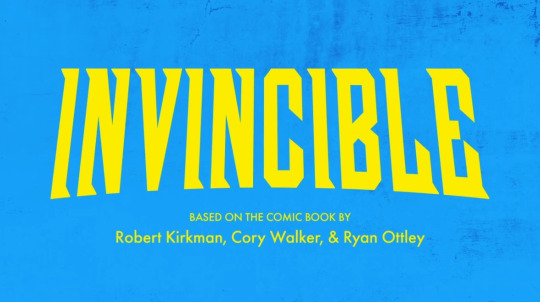
Salutations random people on the internet who most likely won’t read this! I am an Ordinary Schmuck. I write stories and reviews and draw comics and cartoons.
When I first saw the sneak peek of--

...I...didn't...think it would be anything all that special. I love animation, and I love superheroes, so it would go without saying that I would love an animated series about superheroes. But the animation looked a little too stiff for my liking, and aside from featuring J.K. Simmons, there wasn't anything grabbing me when it comes to this show.
Then I heard some s**t goes down at the end of episode one. So, letting my curiosity get the better of me, I binged the entire series in a day to see what the fuss was about. And, um...Yeah. Holy s**t.
This is a series that will very much make you uncomfortable in all the right ways. However, it is a gigantic gorefest at times, so if you get queasy after a single drop of blood, DON'T WATCH THIS SHOW! Trust me, you will not be prepared for what this series has to offer.
At the same time, I highly recommend you watch this series before reading this review. I'm going to spoil major plot points and characters so I can appropriately discuss what I think about the season, so trust me when I say you should click away if you haven't watched it yet. It's one of those series that are better to go in as blind as possible. You can call it a cheap way to appeal to shock value, but I call it one of the best reasons why--

...Is a contender for best-animated series of the decade--That bit with the title card isn't going away anytime soon, is it?
WHAT I LIKE
The Guardians of the Globe vs. The Mauler Twins: This is the best possible way for the series to begin. The first fight scene is bright, colorful, and kinda fun. Thus setting the ultimate expectation subversion in making audiences think that will be the series staple. However, just because it has the energy of a harmless superhero fight, there is a sense of intensity as the Guardians give their all in saving others. Like that moment with Darkwing (Not the duck) as he rescues that woman without hesitation, despite knowing he might die because of it. Or Green Ghost, who just barely rescues all those civilians from that falling debris. It shows that you don't need intense scenes of violence to make a fight scene thrilling to watch.
Diversity Wins: I don't know how diverse the comics are compared to the show, but I'm impressed with how inclusive this series is. So many members of the main cast are people of color, with the main lead being half-Korean. And it's not just different races that the series shines a light on, as we also get the rare, but very much welcomed, animated male gay character. Who's thankfully isn't cliched in ten ways to Sunday...for the most part. It really does seem like writers are starting to grow up and that it's better to be as inclusive as possible instead of pretending certain people don't exist for the sake of "convenience." It might not solve oppression in general, but it certainly makes certain people feel better, even if it is briefly.
Mark Grayson: Mark is a pretty solid super-protagonist if you ask me. Sure, at first, he comes across as whiney...and even more so in later episodes, but he's really an endearing character at times. Mark nails the role of the relatable everyman that's also inspirational with his determination since he never gives up until beaten to the inch of his life. Seriously, while he might not entirely be--

...I guess that bit with the title card really isn't going away.
Anyways, while he might not entirely be invulnerable in the literal sense, he is very much so in the figurative sense. Mark, in so many ways, refuses to call quits once he finally gets the hang of being a superhero, which is what makes him so inspirational. Plus, it's funny seeing how much of a rookie he can be to the gig at times. Mark is far from a perfect lead but is still charming to a fault, and it's nice seeing him grow more heroic each episode. I hope to see him develop more in future seasons, as he has the potential to be ranked higher up as one of my favorite superheroes (it's hard to compete with Spider-Man and Batman, but he'll make me consider it).
Debbie Grayson: This is almost what I expect a mother and wife of superheroes would be.
Your son is constantly crash landing in your yard? Tell him to knock it off because he's past his curfew.
Your husband disappeared into another dimension to fight off invaders? Shrug it off and expect that he'll be late for dinner.
It's a ton of fun to watch, and I adore how supportive she is of Mark, despite how much danger he could be in as a superhero. But, what really endears me with Debbie is her complicated feelings with Omni-Man. There's not a doubt in my mind that she loved him with her whole heart, but she also isn't an idiot. She is quick to pick up how unheroic her husband can be at times, often scolding him for it when necessary. And when she finally starts investigating if he really did kill the Guardians, I love that she instantly comes up with every single plausible excuse she can, despite knowing the truth. Because she believes that she knows who Omni-Man is and refuses any possibility that he might be a supervillain. So when she finds out that there really is no other explanation and hearing him call her a pet (big ouch when that happened), you wanna know what she does? She cries. Not because the man she loved is gone forever, but because the idea of him is. And it's that level of emotional devastation that comes from those complicated emotions that make me think Debbie Grayson is the most complex and endearing character on the show. And I. Will. Stand by that.
Seeing the Guardians of the Globe on their down time: Wow, what a cute collection of scenes that are charming as much as they are heartwarming! A set of scenes that show how human these characters are with their close relationships with friends and family! I sure hope it's not followed up with a brutal emotional gut-punch of a scene that will be even more devastating after thinking back on these! Especially with that bit with Martian Man and the little girl, cause OOO-WEE, would THAT tear me up inside!
Omni Man destroying the Guardians of the Globe:...I'd follow through on my joke here, but holy s**t.
That's really the best way I can describe all of this. It is a brutal, I repeat, BRUTAL scene that will stick with you hours after watching it. Not only that, but it's one of the few instances when I was damn near speechless because I couldn't think of anything else to say other than, "Holy s**t." The only time another superhero property did that was Avengers: Infinity War, except with that, the only difference is that the characters come back. Here, except for The Immortal, the Guardians stay dead! There's no magic amulet or alternate versions from another dimension. No, they die and never come back. Thus setting up how serious the show can be. Because if these superheroes can stay dead, then so can others.
Plus, what makes it more impactful is how throughout the entire fight, there was a glimpse of hope that the Guardians can beat Omni-Man. I heard he got nerfed for the sake of drama, and I approve of that decision. Because if he was really--

...If he was really unbeatable, then the fight doesn't have weight to it. There wouldn't be a point in rooting for these characters to win when we already know they're going to lose. But, by showing there's a chance that they could win, it becomes all the more intense watching the fight and even more tragic seeing them lose. It is a masterpiece of a battle that proves once and for all: Batman is right. You need contingency plans.
Omni Man: J. Jonah Jameson has become the one thing he hates the most: A masked MENACE...Ok, I know Omni-Man doesn't wear a mask, so the joke doesn't work as well as it could. But it was served to me on a silver platter, damn it! I had to take it!
In all seriousness, though, Omni-Man might give Homelander a run for his money on best evil Superman. Because while Homelander might be terrifying in his own right with his style of evil, Omni-Man takes it a step up a notch with the mystery behind WHY he killed the Guardians of the Globe. We know right away that there's something off with him, but up until that point, we see multiple instances of Omni-Man doing the right thing rather than the wrong. Sure, he might come off as cold when interacting with people, but so does Batman and other great superheroes in comics. That doesn't mean he's evil. So when he does do something so incredibly heinous, we're left with this mystery as to why. Because there has to be a reason for it all, right? Like, maybe mind control or his family was threatened. Something and anything that means he was forced into killing the noblest of people. So when it turns out that his actions were intentional, it is already pretty devastating. But when we find out why he does these things, it paints how truly evil Omni-Man is, given how little respect he has for human life.
Plus, as terrifying as Homelander is, Omni-Man is ten times more of an engaging villain. With Homelander, what you see is what you get: A narcissist with a god complex. For Omni-Man, it's more or less the same thing, but it's something fed to him because of the conditioning from his planet. There is a tiny, molecule-sized part of him that genuinely cares about others. It doesn't change what he does, nor does it mean he deserves forgiveness (far from it), but it hints that maybe he's not evil because of his own ego. It's because of how he's trained to be. And judging by his pained expressions from Mark's words and the single tear he sheds when leaving everything behind, there's a chance that he might be willing to fight back that mentality.
Or he will stay evil, and that he'll return to do worse things in the future. I don't know. I haven't read the comics. But I feel like I don't need to read anything to tell you all that Omni-Man is up there as one of the most intriguing comic book villains of all time, and I can't wait to see what happens with him next.
This show is f**king Violent: I mean, I refer you back to that scene where Omni-Man destroys the Guardians of the Globe. But, unlike other shows that use violence to force that mature rating, I feel as though In--

...Title card. You were cute the first time, but now your novelty has quickly worn thin.
Anyways, I feel as though this show...uses gore more appropriately. More often than not, death and carnage get treated as a literal joke in adult cartoons because people are sick bastards, I guess. But with...the current series I'm talking about, it all has an impact. No one dies or gets mangled for the sake of shock value or for a laugh. Instead, every instance of this type of violence is to either make a point, set the tone, or prove just how dangerous a specific character is. It makes...the series more mature than most adult cartoons you'll find because it actually brings a worthy discussion for its violence rather than milking it to give the illusion of maturity. And I gotta respect the writers for doing that.
Cecil: This man is basically Nick Fury if he was overpowered but in a good way. There is just something about a man who knows superheroes are needed in the world but also trusts a "hero" like Omni-Man as far as he can throw him. Not only does Cecil have contingency plans for his contingency plans, but the guy also knows to send the right heroes out for the exact missions that require them. Plus, a man is an instant badass when he's stone-faced about a demon saying he'll go somewhere worse than hell and is calm when being face-to-face with an angry Omni-Man.
I don't make the rules. I just abide by them.
The title card gets bloodier with each episode: This is just a really cool gimmick. It proves how intense this show can really be and how the stakes get higher and higher with each installment. Also, I like to think the amount of blood that splashes over the title card reflects how brutal the episode will be, especially with episode eight, 'cause holy hell.
The plot structure: The way the story works is very similar to how a comic book series handles its overarching narrative. Even though the writers begin a new arc that continues for a handful of issues, the overall main plot still develops in the background of the current adventure the hero goes through. That's basically how--

>Intense inhale<
>Calm exhale<
That's basically how THIS SHOW operates. Each episode can be seen as its own story that's given a ton of room to develop with its forty-five-minute runtime (which blew my f**king mind when I started binging it). Despite that, there's still a great sense of continuity. Everything involving Omni-Man and the mystery behind his murder of the Guardians gets fleshed out throughout the season, even when it takes the background of Mark's escapades. It really does feel like sitting down and taking the time to read an entire volume of comics, which I like to believe is the intention. After all, what's the point of making a series about superheroes if you don't make it feel like a comic book at least once?
Dark Blood: I desire a series based on this character alone. I know it's probably just Hellboy, but I want it.
The idea of a demon solving murder crimes to work off his debt in Hell is too much of a remarkable concept to strictly be a c-plot in one series. Give Dark Blood a spin-off, damn it!
The Realistic Portrayal of a Superhero world: Unlike certain superhero properties--*cough* DC *cough*--it's--

>Huff<
>Puff<
>HUFF<
>PUFF<
>HUFF<
It's. This. F**KING. SHOW! That really does an excellent job at portraying how much it would suck to live in a world of superheroes. Sure, you got the cool battles and awe-inspiring heroes with incredible powers, but do you know what else you get? Hundreds upon thousands of people dying from the very threats those heroes fight against. Not to mention all the realistic physics that come from people like Mark trying to save others. Just look at how mangled that old woman looked when he attempted to help her. It, uh...It sure did not look great. Don't get me wrong, I love superheroes and the worlds they live in. But when watching a show like...this one, it really makes me appreciate how I don't live in those worlds with them.
It’s Still Funny: This is something I appreciate the most. When most superhero shows go for the realistic approach, they go with the doom and gloom route, making everything so melodramatic about how serious the world is. But here's the thing: Superheroes are f**king stupid.
Don't tell me they're not because they are. Superheroes have cornball hero names, bright costumes, and logos on their foreheads, chests, belts, and what-have-you. Taking a superhero too seriously is the worst mistake you could make, which is why I love the Marvel Cinematic Universe. Say what you want about Marvel having "too many jokes," but at least they know it's for the best to laugh at themselves and embrace the weirdness. It's something similar with...you know what. Because while the series tells a serious and realistic story about superheroes, it's still a story about superheroes. So it tells some jokes and some pretty funny ones at that. Because while it's essential to include some drama in a story such as the one in...you know what, it's just as important to never forget to have some fun.
“Earth is not yours to conquer.”: Such a great line that gains an even greater meaning once we fully know who Omni-Man is. The main creditor for how effective it is goes to J.K. Simmons for making the line sound explicit yet implicit at the same time.
Allen the Alien: ...It is an absolute crime that this character only has about six minutes of screentime. Allen is such a bro, partially because of Seth Rogan's performance, that I would honestly be upset if he doesn't show up more often in later seasons. Seriously, bring him back for more.
The Mauler Twins: Thankfully, these characters get as much attention as they deserve. The banter between the Mauler Twins is always entertaining, often being the comedic highlights at times. On top of being funny, they also work as efficient villains who can come across as threatening at times.
But what I love most of all about these two is the explanation behind the cloning process. The reasoning of why neither character remembers which one is the cone is a brilliant idea that I'm surprised no one else did in the past (to my knowledge). It also provides some excellent fruit for thought in wondering if it really is better to live your life not knowing if you're a clone or not. The whole thing is great to watch, and it makes me really glad for their inclusion...too bad they had to be forced into a story that makes a character look like a reckless superhero and an inconsiderate jackass to his friend. Seriously, what was up with that?
“That Actually Hurt”: This just might be my favorite episode of the first season. Machine Head is both equally hilarious and devious, Titan might just be my favorite character due to how intriguing his allegiances and motivations are, that final fight was the perfect amount of brutal, and we get the biggest hint of the man Omni-Man really is. Having him simply watching Mark instead of flying in to help him actually shocked me the first time seeing it. It's not until we learn what a Viltrumite really is that it becomes clear as to why. He doesn't care about saving his son but instead seeing Mark reach the same potential Omni-Man did during that smash fest the planet went through to reach perfection. And something tells me he felt more disappointment than sadness after seeing his son get nearly killed by Tony the Tiger (I know he has an actual name...but this is funnier to me). It's such a solid moment with great implications that just so happens to exist in an even greater episode.
Eve deciding to just help people for the heck of it: I actually love this idea more for the potential it has rather than what actually happens so far. Because the main reason why heroes don't fly around and solve every little minute problem people have is that they need to learn how to act without help. If you suddenly make food appear out of thin air or stopping forest fires, you're doing good, but there's also potential harm that comes from it. I think back to that episode of The Powerpuff Girls, where the townspeople are so idiotic and complacent with having their heroes solve every problem that they really can't think or act for themselves. A similar thing can happen with Eve if she's not careful. Even worse, if she keeps trying to end famine for farmers, because she might get into a Supergirl situation with people building a cult around her. And, you know, that's not going to be fun.
But again, that's just the potential that this presents. We--Or the people who haven't read the comics--don't know if Eve will actually face this issue. Regardless, we still get some solid moments that proves just how much Eve is a true hero in this series as she has no other motive to help people other than she just wants to. And I actually think that's pretty cool.
The Immortal’s rematch: I gotta hand it to the guy. Not a second after being brought back to life, and The Immortal's already flying off to get revenge on the bastard who killed his closest friends in the world. Or, globe, I guess.
I respect that, to be honest.
(As a bonus, The Immortal causing Omni-Man's eyes to become bloodshot adds to how evil he'll be in the last episode)
Mark trying to snap his dad out of mind-control: Oh, I felt that.
I'm pretty sure we all felt that.
Ow...Big ow.
The Train Scene: ...This is the most horrific thing I have seen in entertainment. Seriously, while Omni-Man annihilating the Guardians left me speechless, this is another level. Because him using Mark's body to kill a train full of people ramming into them, leaving Mark all the more helpless to stop it, makes a scene that is so...so hard for me to describe how effectively f**ked up it is. It's one of those moments where just by seeing it, you know why it's awful in all the right ways. And I will never forget the look of shock and horror on my face when it reflected onto my laptop's screen after the scene briefly cut to black soon after the carnage. Because if that doesn't explain how unmerciful this moment is, I don't know what will.
Saving Mark after the fight: I really love this because as it flashes between still images of people carrying Mark away after his brutal fight with Omni-Man, it really feels like you're reading a comic from panel to panel. It’s pretty neat. I won’t lie.
WHAT I DISLIKE
The Animation isn’t that great: Now, in terms of action, the animation is fantastic. You feel the impact of each attack, there are some creative uses of powers, and the gore is better implemented because it's all animated. As for everything else...yeah, it kinda sucks. Movements are a little stiff at times, the CGI backgrounds could use a bit more polish, and don't get me started on the CGI crowds of people. I understand the shortcuts that need to be taken to make everything else more effective, but man, this series needed a little more time in the oven before being shown to everyone. It's never too bad, but it can be pretty distracting at times.
Amber: F**k Amber. Just f**k her. Everything people tell you that is wrong with her is one-hundred percent on point. She is easily one of the worst love interests, and to me, it has everything to do with the fact that she knows Mark is--
...That she knows Mark is--
...
...
...ThatsheknowsMarkisInvinci--
--BECAUSE IT INVALIDATES ANY POINT SHE HAS, GOSH DANGIT! I don't give a single S**T if she's upset that he's late all the time! If Amber was always unaware of it, then I would understand. But having her know means that she thinks her issues are more important than Mark, oh, I don't know, SAVING THE PLANET! I mean, the girl helps feed the homeless! You would think she would understand.
But fine. Maybe Amber's just upset that Mark's lying to her. Sure. That's understandable...BUT WHAT THE F**K IS UP WITH HER BLOWING UP IN HIS FACE FOR NOT HELPING ANYBODY AT THE COLLEGE WHEN SHE KNOWS HE'S HELPING EVERYBODY!? Even if it's her giving Mark one last chance to tell her the truth (which is a mile of a stretch, and you know it), did she really expect him to reveal his secret with tons of people watching? That is a crazy expectation that no one should live up to!
Amber is quite possibly the worst thing about this show. She was fine at first, and her chemistry with Mark was on point, but MAN, did she get worse later on.
And if I see one mother f**ker calling me a racist because I don't like this character who just so happens to be black...I'm going to be upset, not gonna lie. Because that is a cheap shot to dismiss any criticism, especially since her race has NOTHING to do with why people hate her...Or, at least, most people.
Edit (5/27/2021): Disregard the above. The long and short is that I don’t like Amber. She just doesn’t sit right with me for the reasons that her anger towards Mark just never felt entertaining to me in comparision to everything else. But saying her thoughts and arguements are invalid is not cool, and I’m sorry to both any readers who are black or especially female who would be upset by this.
Rex-splode: I understand the point behind Rex. He's a character who we're supposed to hate, so it becomes so much more satisfying seeing others s**t on him. But those characters are hard to get right if you’re not careful. Make them too irritating, then any suffering they go through will seem too little. Make them not annoying enough, and their punishments can be too harsh. Rex fits into the "too irritating" category. It's satisfying to see Monster Girl wreck his s**t after he started commenting how ineffective she might be, but with what he pulled with Dupli-Kate, I feel as though he might deserve worse. Although I will admit Rex gets slightly better in later episodes, showing at least a smidgen of character development. But I don't think it's enough to make his a**holeness worth it. Still, I hope he at least becomes above decent in the next few seasons, which is way more than what I can say for Amber.
(Seriously, writers, if she just disappears without an ounce of an explanation in the season premiere, I won't question it. You have my word.)
Edit: I no longer agree with what I crossed out, but I won’t delete it either. I want people to know the mistake I made so I can prove that I changed in the future.
Robot cloning himself to be with Monster Girl: ...Nope!
Nope!
Changed my mind.
I am NOT touching that.
I will touch a lot of things, but I will not touch--That came out wrong.
Please forget you read anything.
Thank you, and goodnight.
Let’s move on
Transitioning to the title card: Here it is! The nitpickiest of all nitpicks! But, seeing how it happens in every episode, meaning that the writers have no choice but to commit to it, means it's one of those things that viewers are forced to get used to. And boy, is the transition to the title card hard to get used to! Oh, you thought it was annoying how it kept happening in this review? Well...fair enough. But trust me when I say it's much more aggravating in the show.
The funny thing is, I had no problem the first time it happened. It was a cute way to introduce the character as well as the title of the series. But having that be the basis for transitioning to the title card every time was a gimmick that got old real quick. Especially since every time that a character says the word--

--it always feels forced. What's even more annoying is that sometimes it interrupts characters as they're saying invin--

LIKE! F**KING! THAT! Because interrupting someone before they say something is one thing, but doing so as they're saying it shows a sense of bad timing. Not even that, because this is something that I feel like could have been the easiest to change in the series by having someone go, "Hey, maybe we should edit out this single second."
It's laziness that doesn't happen often, but it still grinds my gears a bit. Plus, is there really no other smoother transition the writers could come up with? Did they really believe this is the best way to do it?
Think, writers! THINK!
It's fine to have a gimmick, but this is one that really shouldn't have any follow-through on.
-------------
That's about all the issues I have with the show. It's far from perfect, but still, an A- is pretty impressive work. The stuff that this series does right not only outnumbers the mistakes but also heavily outweighs them. Besides, no show in the history of creativity has ever been perfect in its first season. There are always dents that need to get buffed out and improve upon for the subsequent seasons to come. Only then can a series truly be Invincible from all criticism.
...
...Oh, sure.
SURE!
NOW it lets me say it!
GOSH, DANGIT, I HATE THAT TITLE CARD!
30 notes
·
View notes
Text
The Bizarre World of “Feel Good” Murder Mysteries

When I think of murder, I don’t typically think of warm, fuzzy feelings. If you’ve been following my blog, you know I’m a fan of all things gritty and gory, so a lot of the books I read fall into the thriller/suspense subgenre. But not everyone likes their mystery novels with an extra helping of blood and guts — in fact, there’s an entire subgenre of mysteries designed to make readers feel good.
According to Wikipedia, “Cozy mysteries, also referred to as ‘cozies’, are a subgenre of crime fiction in which sex and violence occur off stage, the detective is an amateur sleuth, and the crime and detection take place in a small, socially intimate community.” Think Angela Lansbury a la Murder, She Wrote. It’s a very PG approach to a genre that is usually a hard R.
Like romance, the cozy mystery is a subgenre mostly read by women. According to cozy-mystery.com, a website dedicated to this type of book, “Many cozy mystery readers are intelligent women looking for a ‘fun read’ that engages the mind, as well as provides entertainment.”
Any time a genre is marketed to one gender over the other, I automatically wonder why. Is it because women are seen as less likely to enjoy “hardboiled” detective fiction than men? Is it because women “have weaker stomachs” or “can’t handle violence”? Is it because everything made for women needs to be cutesy and fluffy?
To try to answer these questions, I read three different cozies to see if I could determine why they’re so popular and why they’re marketed to women. Here’s what I found.
And Then There Were Crumbs by Eve Calder
Quirky settings seem to be a recurring theme in cozies, with more than a few of the subgenre’s beloved heroines doing double duty as amateur detectives and small business owners. In And Then There Were Crumbs, the small business in question is a bakery nestled in a ridiculously beautiful beachside town.
The mystery is not the main focus of this book. Really, it’s about Kate recovering from a messy breakup and trying to save a small-town bakery from going under. The murder is just icing on the cake, so to speak.
Unfortunately, the mystery was the weakest part for me. It’s not bad, by any means, but it does feel a little too clean. I’m the type of reader who likes to try to figure out the mystery alongside the characters, and this story didn’t really let me do that. There aren’t any compelling suspects to speculate about, and the solution is only possible after Kate stumbles onto a missing clue that brings everything together. This is a device used a lot by shows like Murder, She Wrote, and it’s always been a little bit of a pet peeve of mine.
The rest of the plot is well-written and full of warm fuzzies, but as someone who was mainly interested in the whodunnit I was a little disappointed.
One thing I will say for And Then There Were Crumbs is that it made me crave cookies so badly I had to bake a batch of snickerdoodles after finishing it. That’s gotta count for something.
Final Rating: 💀💀💀 (3 skulls out of 5)
Sinfully Delicious by Amanda M. Lee
Like in And Then There Were Crumbs, the mystery is not the main focus of this book. Sinfully Delicious is, at its heart, a second chance romance about a down-on-her-luck author who moves back to her hometown and reconnects with her high school sweetheart. That she happens to discover a dead body on her first day back, and that the previously mentioned high school sweetheart happens to be the police officer investigating the case, is incidental.
As I was reading this book, I noticed another running theme in the cozy subgenre. Both And Then There Were Crumbs and Sinfully Delicious go out of their way to establish that the murder victims were very, very bad people. Of course no one deserves to be poisoned or stabbed in a back alley, but if anyone did, it would be these guys. In a way, this makes the murders less disturbing since they almost feel justified.
Sinfully Delicious spends even less time on the mystery than And Then There Were Crumbs — at times, it almost doesn’t feel like a mystery novel. The romance really is the main focus here, and I had serious issues with it. Stormy’s ex-boyfriend/love interest has a girlfriend, and there is definitely some emotional infidelity — what Bustle calls “micro-cheating.” To make us feel better about this (and to keep Stormy a sympathetic protagonist), the author makes the girlfriend so unbelievably bitchy and unlikable that we can’t help but hate her. I’m very tired of girl-on-girl hate being used as a plot device in romance novels, and this book is one of the worst offenders I’ve encountered in a while.
The murder subplot was pretty standard. The last minute reveal that pulls the whole mystery together appears once again in this book, followed by a conclusion so outlandish, it actually made up for some of the lackluster buildup.
I did enjoy the fantasy elements in Sinfully Delicious. Stormy discovers that she is a witch and possesses magical powers, but like a lot of other cool things in this story, the witch stuff gets pushed aside to make more room for the romance nobody asked for.
Final Rating: 💀💀 (2 skulls out of 5)
Agatha Raisin and The Quiche of Death by M. C. Beaton
The Agatha Raisin series is a staple of the cozy subgenre. With 30 books and counting, the series has been going strong since the early 1990s. Because this book (the first in the series) is quite a bit older than the other two I read, it isn’t quite as formulaic. It’s definitely heavy on the Agatha Christie inspiration (in case the protagonist’s name didn’t make it obvious), and it’s all very, very British.
Once again, the mystery isn’t the only thing going on here. This book is about Agatha, a fifty-something-year-old business woman who sells her PR firm, goes into an early retirement, and buys a cottage in the Cotswolds, only to realize that village life will be a harder adjustment than she thought. She feels torn between her new village, which isn’t at all like she imagined, and her old life in London, which is quickly moving on without her. Oh, and one of her new neighbors dies of poisoning after eating a quiche Agatha entered in a local baking competition.
I really liked Agatha as a character. It’s nice to see a single, middle aged woman who enjoys being single, and it’s interesting to read a story that deals with themes of getting older and planning for retirement. Agatha is also kind of a bad bitch, and I enjoyed reading about her aggressive, take-no-prisoners attitude.
The story really reminded me of Agatha Christie’s Miss Marple series, which I’m sure is intentional. I can just imagine the author thinking, “But what if sweet Miss Marple was replaced by a London businesswoman?” and then writing this book. The supporting characters are all quirky and eccentric in some way, and some moments are genuinely humorous.
The murder mystery plays a more central role in this book than the first two I read, with Agatha doing lots of good, old fashioned snooping, breaking and entering, and harassing suspects. The conclusion was a little bit of a letdown for me — I think the author could have gone in a lot of different directions, but chose the most boring one.
Final Rating: 💀💀💀 (3 skulls out of 5)
Conclusion
I really can see the appeal of this type of mystery. These books are perfect for readers, both men and women, who want a fun mystery that they can try to solve alongside the protagonist, but who don’t want to read graphic descriptions of violence. I really do think there’s a place in the larger mystery genre for stories like this.
These books are also great for when you aren’t sure what genre you want to read. There’s a little bit of murder, a little bit of women’s fiction, a little bit of humor, and sometimes even a little bit of romance. It’s a grab bag of some of the most popular genres of fiction, and it speaks to readers with eclectic tastes.
Since I discovered the existence of the “cozy mystery” label, I’ve been using it to find books to read when I’m not feeling anything super intense. I read a lot of horror and thrillers, but sometimes I can get burned out on that type of intensely emotional (and often disturbing) story. When I want just a taste of intrigue without the blood and guts, cozies are a good option.
If you’re an avid reader of more intense mysteries, I recommend checking out this more lighthearted side to the genre. Who says a book about murder can’t be uplifting?
#cozy mystery#agatha raisin#book#book review#bookblr#bookish#bookworm#thriller#suspense#murder she wrote#agatha christie#romance#feminism#women's fiction#mystery#my reviews#mine#light academia#dark academia
25 notes
·
View notes
Text
Riverdale should have been a Disney show
Riverdale should have been a Disney show. There I said it. I'll admit the first season was fine Great even. Self-contained with an intriguing mystery and you waited at the edge of your seat for what will happen next. But then... Part of the problem for me is because I've read the original comics since I was a girl. I still do get some from my mom, and the way they have changed the characters just bug me.Betty used to be the girl next door, always hopeful, smart, trying to figure out the mystery. And it was perfect that she was a reporter because Betty was always someone who valued honesty so her being the roving reporter was perfect. And her taking pills for anxiety or some sort of disorder was also a nice take because she does take on so much, and tries so hard to help and be good and nice and perfect. All the stress. Archie was also great in the first season. A bit horny, but he means well, and he truly is an average American boy so his big trouble of choosing between music and football. He's a klutz and sometimes his plans go sideways but he means well, he's all for family and Riverdale and school spirit. None of this whole Red Hood/semi mafia/wrestling nonsense. I actually really liked their take on Veronica, she still a bit materialistic and thinks she can depend on her wealth to get her out of trouble but I do like their take on trying to be enterneauripal and working to act less high class society girl as she was used to.
Jughead, I'm conflicted with. Because he's good I guess as a brooding, investigative journalist he's good. It fits the setting of the show. But I do have a soft spot for him as the sane man to Archie. Going about his business, surprisingly philosophical. And you can't forget the most important attribute to him. His love of food! I miss that. Like the one scene in season 1, I forget what exactly but basically he ordered burgers and when Cole Sprouse just protectively held the burger to him...such a nice touch. That sort of guy I can see as a DCOM. The genius ditz I guess it's called. But he's not dumb. He just prefers napping to being awake.
Now the others...omg.I have a bone to pick when it comes to the other characters in Riverdale. Josie and the Pussycats-- they are such lively musicians who solve crimes, sometimes in space. ABsolutely wasted here. Melody barely had any lines. And they didn't have Alex or Alexandra Cabot which was such a shame. I know, I know they're in the new Katy Keene show but having them be step-siblings who used to date is wrong and weird and bad and no! Stop having the twins in these shows with vaguly incesteous feelings. It's weird!
Kevin Keller, all his storylines revolve around his bfs or lack of bfs or how much he wants a bf. The Kevin of Archie comics was so much more well-rounded. He was head of ROTC, he was class president, he ran marathons, he was Veronica's bff, he was a reporter. He had an appetite to match Jughead's. He even had a brief crush on Jughead! He was so much better than this sham. He was confident in who he was and did his best to help others feel good about themselves too because he knows not everyone is lucky to come out as LGTBQ in a supportive environment.
Reggie. I think not giving him enough of an arc in season 1 really backfired because if he appears, it's only as Veronica's arm candy. Which is a shame because he is a good contrast to Archie. A bit richer yet a cheapskate. Thinks he's a casanova, loves being the class prankster. A modern day politician with his sweet words when all he cares about himself. Basically like

Yet he has his hidden depths with his neglectful workaholic parents and jealousy of Archie's popularity. Cheryl. Omg Cheryl. They have ruined you here. I'm sorry, I do NOT find any of her lines iconic. It's like she swallowed urban dictionary and a gothic novel and came out all jumbled in a google translate. She may be abused but the way she still treats others like shit and gaslights her gf and makes everything about her is just...ugh!!! OMg, comics Cheryl is actually fun and iconic. She's as rich and pretty as Veronica and unafraid to use it. She wants to be a star like a modern day influencer. She's a red-haired Sharpay Evans basically.
Also Jason, her twin whom they sadly killed off. He was also fun like a meaner, snobbier version of Reggie. But with a huge crush on Betty which I think could have been used to milk such drama.
Polly also got hit badly. She was a good older sister. She was a reporter, and inspired Betty's enviormental-feminist activities. A sane person. Not a cult worshipping cuckoo. Toni Topaz, ah she was so good in season 2 and then they made her Cheryl's arm candy. Alas. I liked her as a friend to Jughead. In the comics, she was his equal in food contests. That's no small feat. She was cool, and joined Betty's band and... she was her own person. Remember when Toni used to be a photographer for the South Side paper. Yeah. Basically Toni as a 3d character with personality. Please return.
Dilton. Oh Dilton. Once the smartest person in the Archie universe and they turned you into a survival freak to get killed by the gargoyle king. Or whomever. I just remember he got killed somehow. Honestly, they should have stuck to smart Dilton. They need a smart scientist there, cuz no one is using their brains in Riverdale.
Chuck. They have done you SUCH A DISSERVICE! So so bad. Chuck was a good person! He was a cartoonist, and a basketball player and Archie's friend. (Yeah, that's right Archie has friends in the comics. Even though Riverdale makes some effort to show Archie and Jug's bond, they're mainly consorting with their gfs. In the comics, they had guy nights. Reggie, Chuck, Kevin, Dilton, Moose. Come on show. Friendships are just as important.) And what did they do, make him a lying scumbag, turn him good and then have him arrested because of what Cheryl did! No, no no. Bad writers. Just no. Ethel Muggs. You have also been wronged in season 3. Making her a crazy freak. Ethel in season 1 was nice. Ethel in the comics is nice. Plain but with a good heart even though she had a slightly obsessive crush on Jughead. Here, making her cult worshipper.... smdh. Okay at this point I know I sound like a bitter, bitter person complaining how it'S nOt liKE tHe cOmICs. But hey, I admit season 1 was good even if they changed the characters a bit. It’s just that I watched Riverdale because of the property it derived from. Because of the comics. At the least I expected some faithfulness to the characters. Not make them all so inconsistent and crazy.
It's just the writing is so inconsistent! The plots hop around and so do their moods. Bughead and Choni broke up for one episode and then they got right back together. Even though they had VALID reasons to break up. Nope. That made fans mad. So they had to get back together. Ugh. And Archie got attacked by a bear and was so traumatized that he broke up with Veronica because "he's changed" for like two episodes before forgetting about it and going back to Veronica. Oh which brings me to the ridiculous "love triangle" of Archie/Reggie/Veronica where she couldn't choose. Please, Archie and Veronica were reuniting and planning to go run away for a weekend together. Reggie was completely forgotten until he walked in on them. And Veronica couldn't decide because she loves them both? No, she didn't. She may have felt bad to tell Reggie but it's not because she loved him. Forgetting a guy so quickly...yeah great proof of love. Horniness maybe. But her indecisiveness makes her look bad. Don’t tease a will they, won’t they when the answer is so obvious. If you're going to do something like that, you should have there be something called CONSEQUENCES! They can get back together but at least wait. Wait 8 episodes at least so they can have character development. But who am I kidding. Character development is not the goal of this show. The character's just move because the writer's want them too not because it fits their personalities. Such as Archie's grieved reaction for baby Teeth in season 3.
Not only do I have no idea when (the ridiculously named) Baby Teeth appeared, much less why Archie or I should care about his death. But sometimes the show juggles too much. Too many characters. Too many plots. It's all so ugh!!! So my final thought on this is... Riverdale should have been a disney channel sitcom. Archie comics are about family friendly entertainment and sometimes imparted lessons... well so does Disney. I get the appeal of having Riverdale reach a new teen generation, but from what I can see the only big thing Riverdale on CW is that it allows alcohol and gartituous sex scenes.
Which is another small gripe of mine. I can handle sex scenes (hello Magic Mike XXL) but so many at such inappropriate moments too It's like that scene in an action movie where they suddenly kiss when they should be running for their lives. No teen is that horny all the time. Plus there's always less is more. If one kisses so much it loses the meaning. If you think your shirtless Archie is going to distract me from lack of plot haha. No. Plot and consistency still sucks and shirtless Archie does not make it better.
But Riverdale as a Disney show can work. After all the comic stories are a bit formulaic. It's all high school hijinks. And all the characters fit an archetype. Archie, the protagonist. Veronica, the fashionista. Betty, the reporter. Jughead, the slacker. Reggie, the class clown/bad friend. Cheryl, the Sharpay, Kevin, the sane one. And if people want a season long story arc with dramatics, Disney can actually handle it too. After all they had the mysterious "threat' lurking in the background of My babysitter's a vampire season 2. Or the Juliet and Mason saga of Wizards of Waverly Place. And if people want adult situations, look on to Jessie. Rewatching an episode now, there were so many adult jokes and references that flew over my head so they could sneak those in. Heck, Disney channel is infamous for all the innuendos they manage. And they handle consistency. Cody and Bailey broke up in Suite life on deck, they actually stayed broken up for a good half season. Gabe matured from a prankster tween to teen in love in Good Luck Charlie. Actions have consequences, characters grow. Storytelling 101
And the best part is they don't even have to think too hard for the plots of the week. They literally can build on stories from the comics. All 80 years of it. And I have put some examples right here from my own Archie comics. Like Veronica literally being the fashion police.
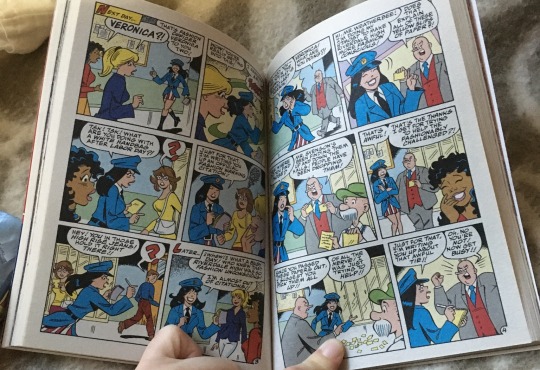
Veronica and Cheryl teaming up + rolling around in their money.
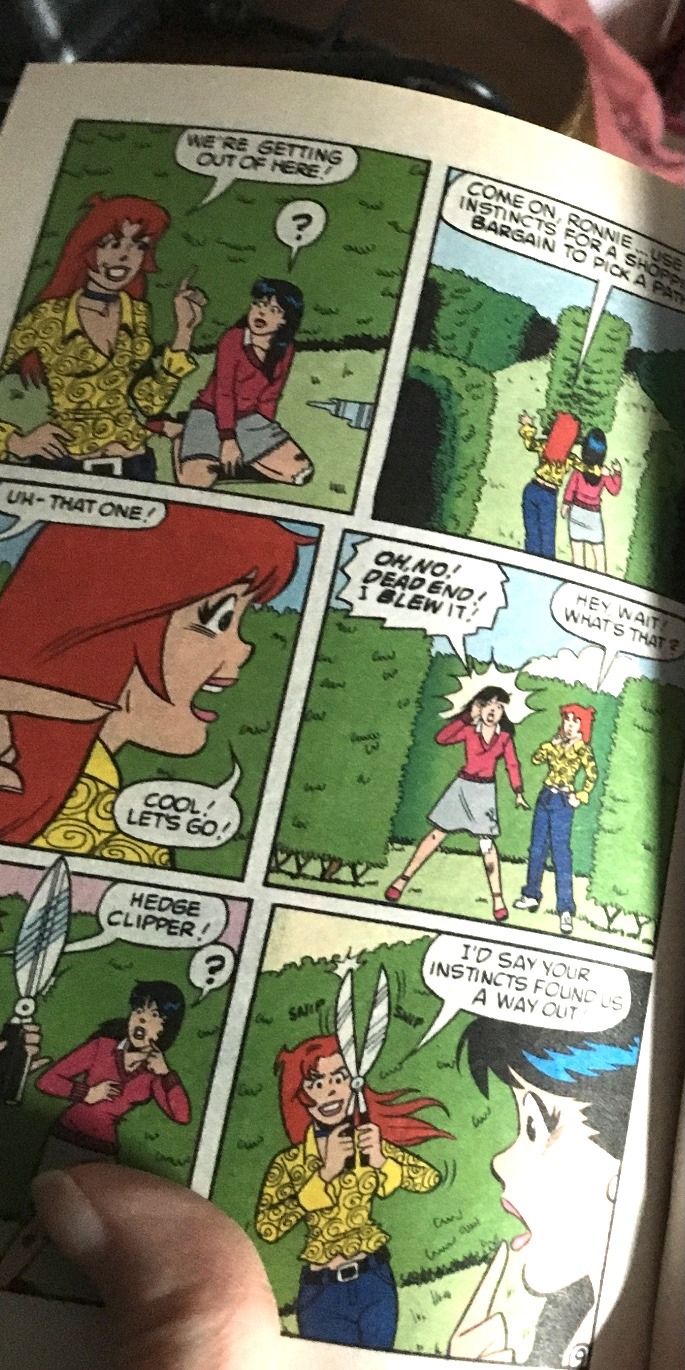
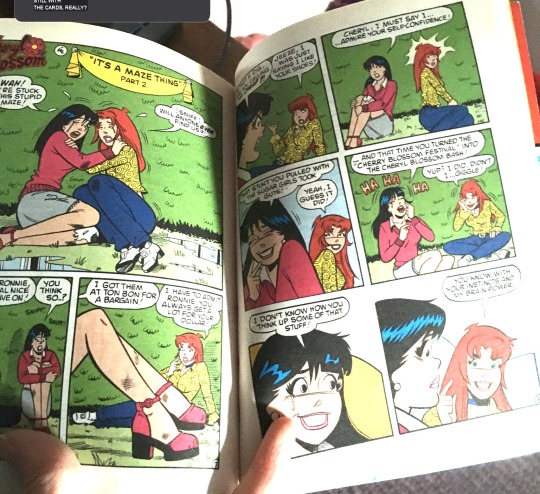
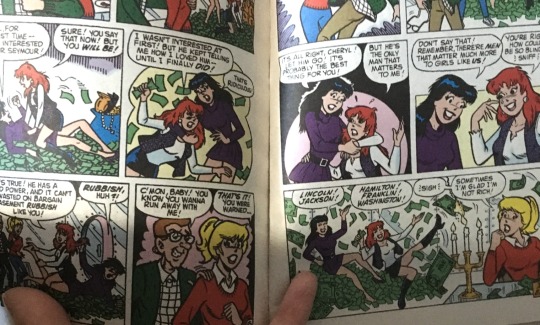
Cheryl changing the Cherry Blossom Festival to the Cheryl Blossom Festival

Archie doing his classic Valentine's Day mix up
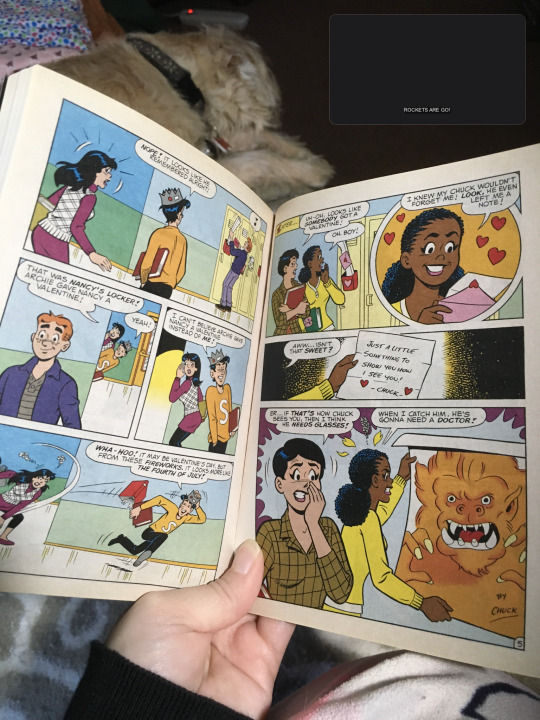
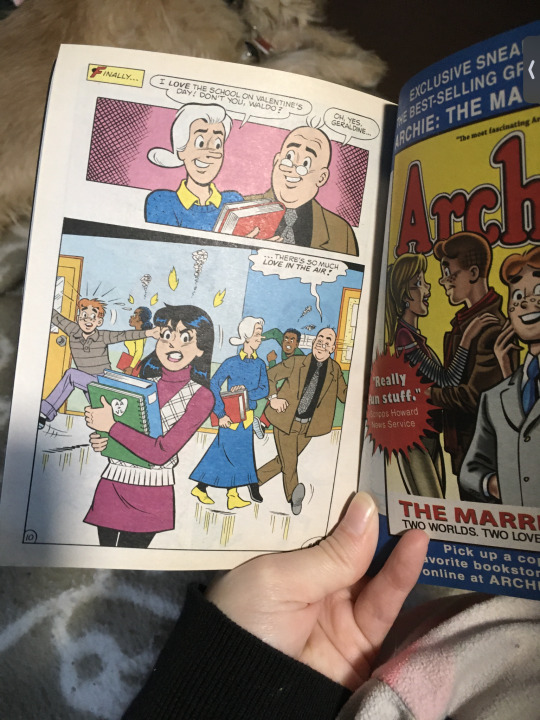
Veronica and Betty buy Cheryl’s maid service when her father forces her to get a job.
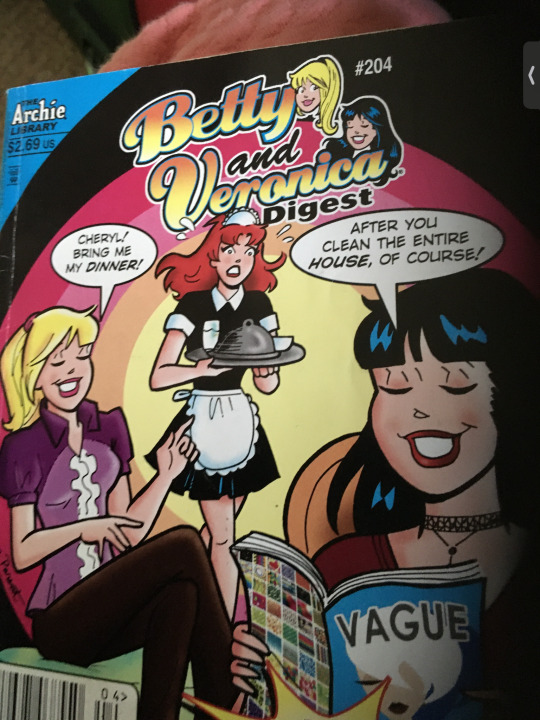
Jughead and Trula (Jughead's nemesis & psychoanalyst in training) get amnesia and become friends.
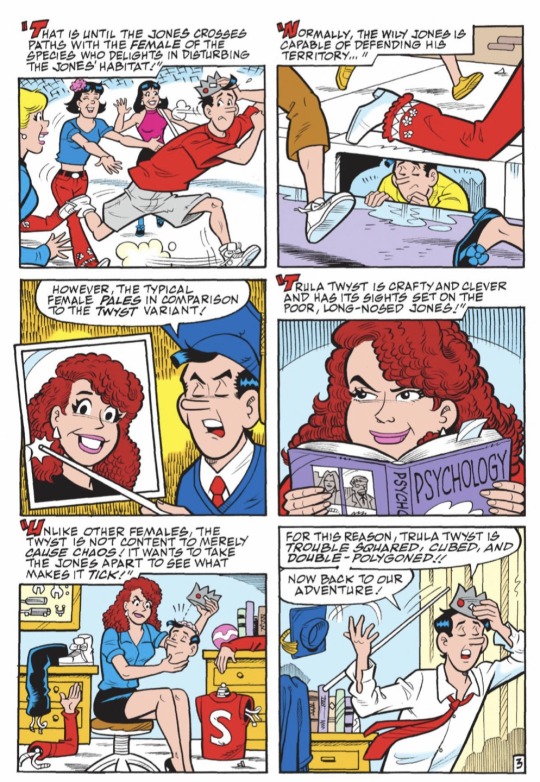
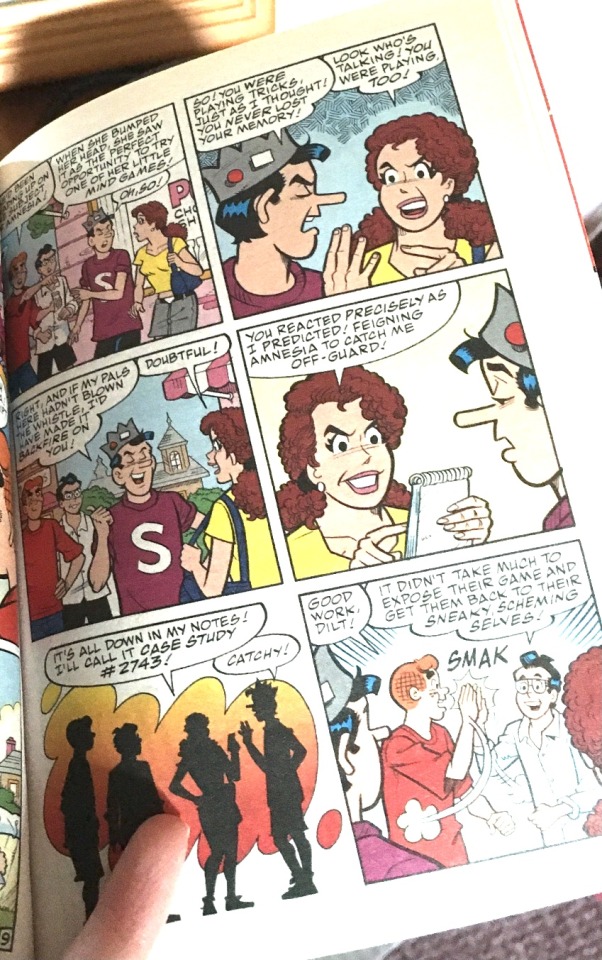
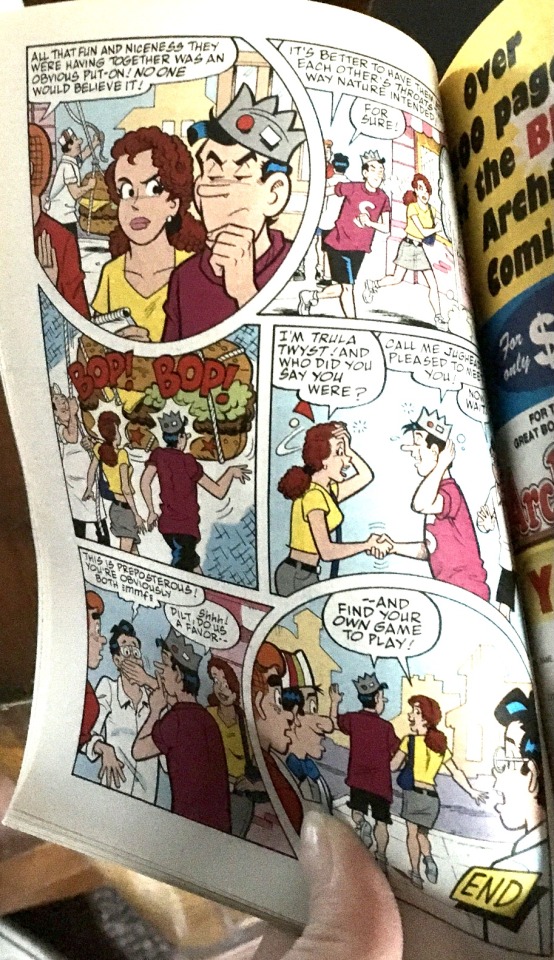
A boy dares to change Veronica
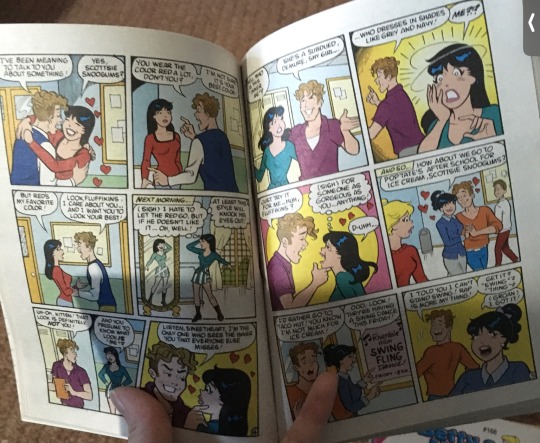
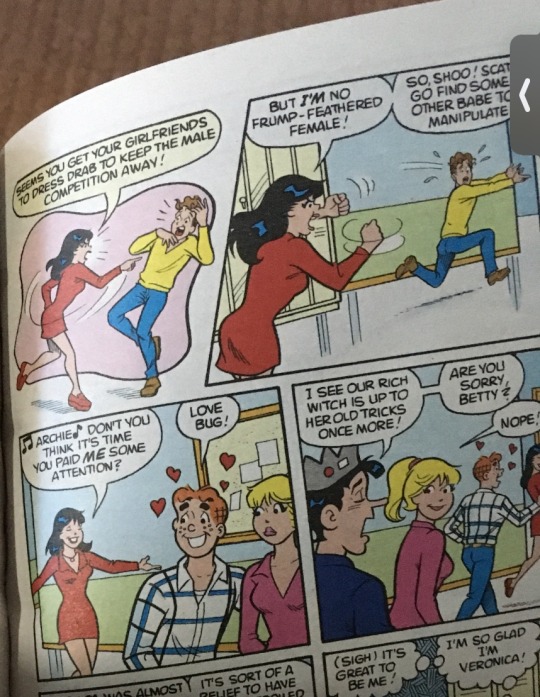
Jughead falls in love with the lunch-lady
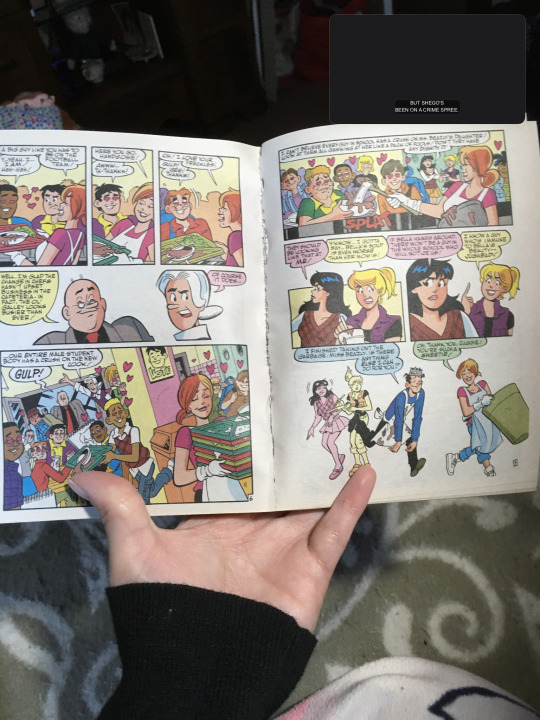
Betty and Veronica pretending to be distressed damsels to get Archie's attention (it backfires)

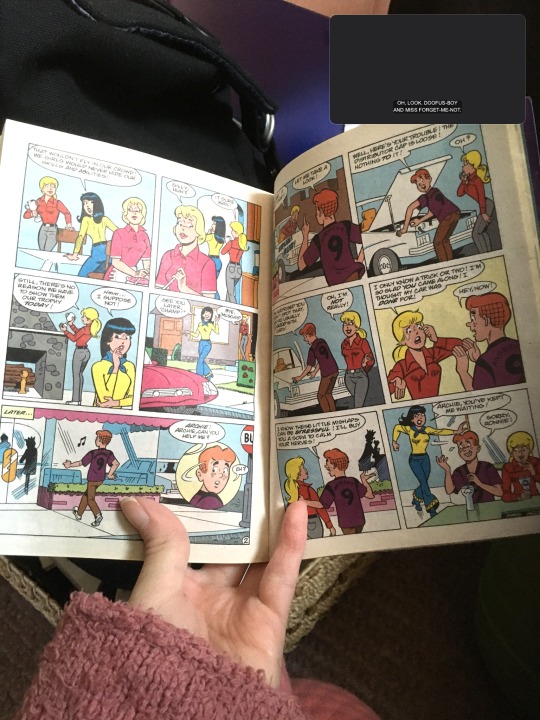
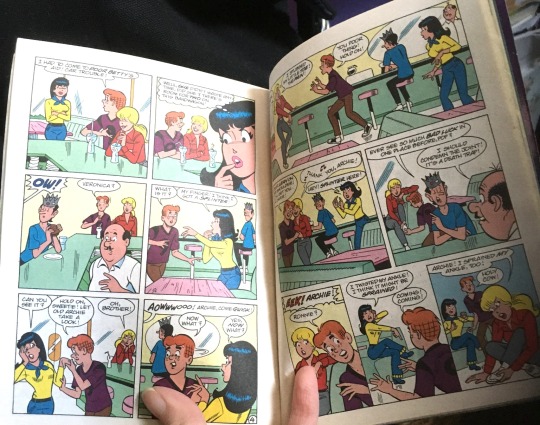
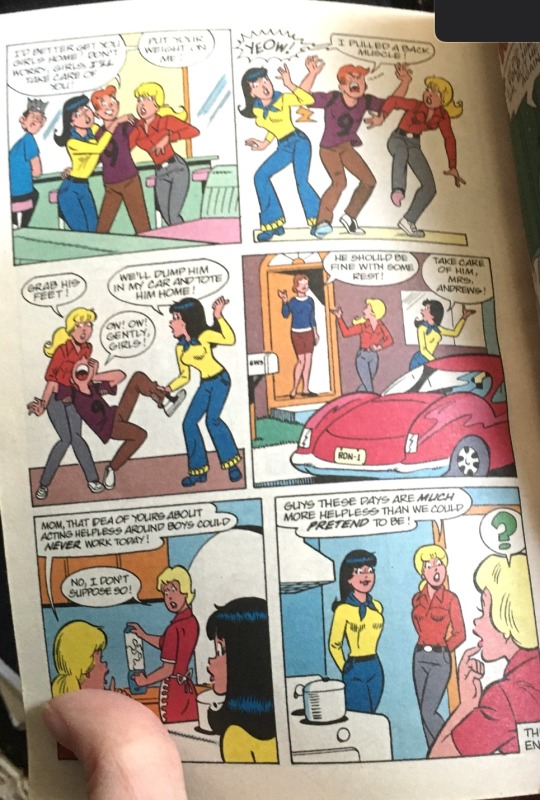
Toni and Jughead foil each other in a food eating contest.
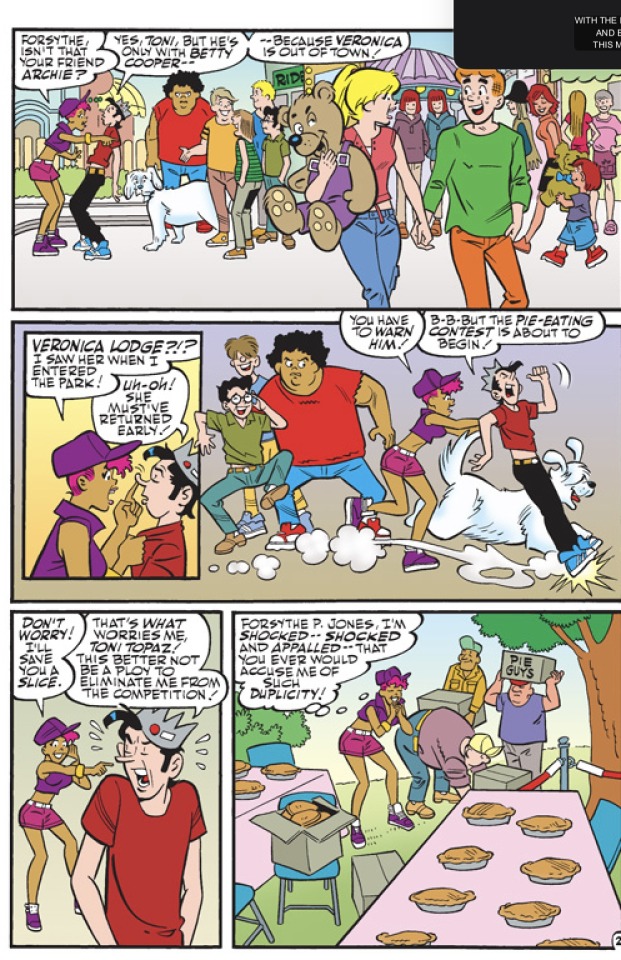
Betty's cast causes more pain to other students
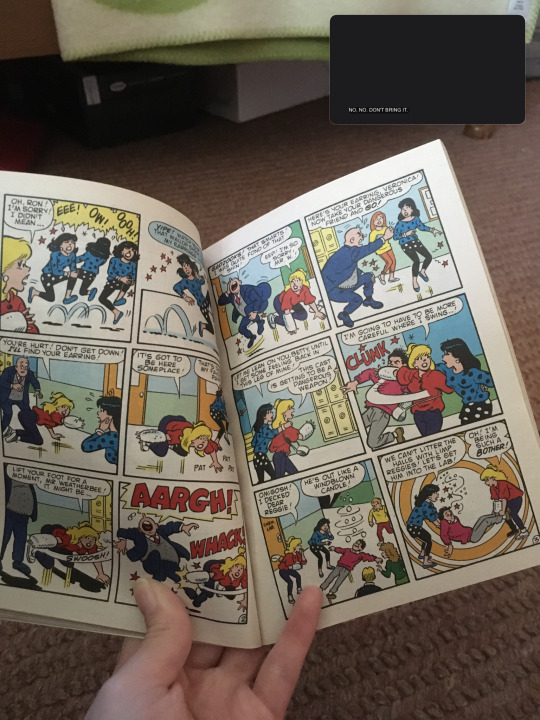
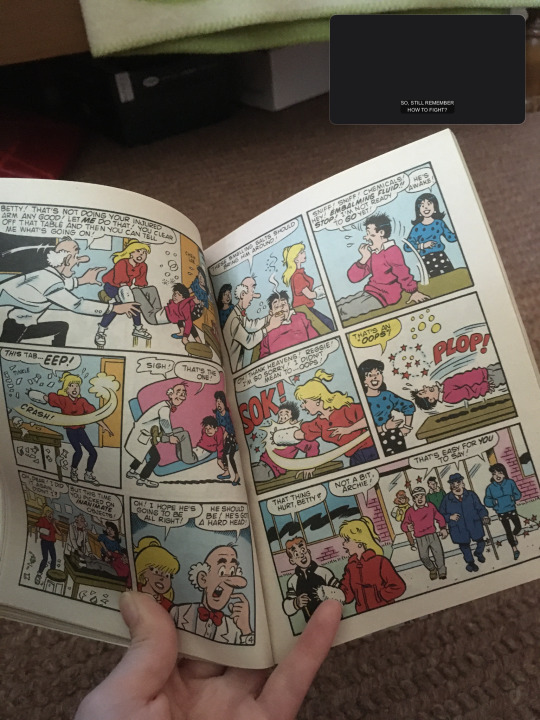
Reggie dates Cheryl (for real)
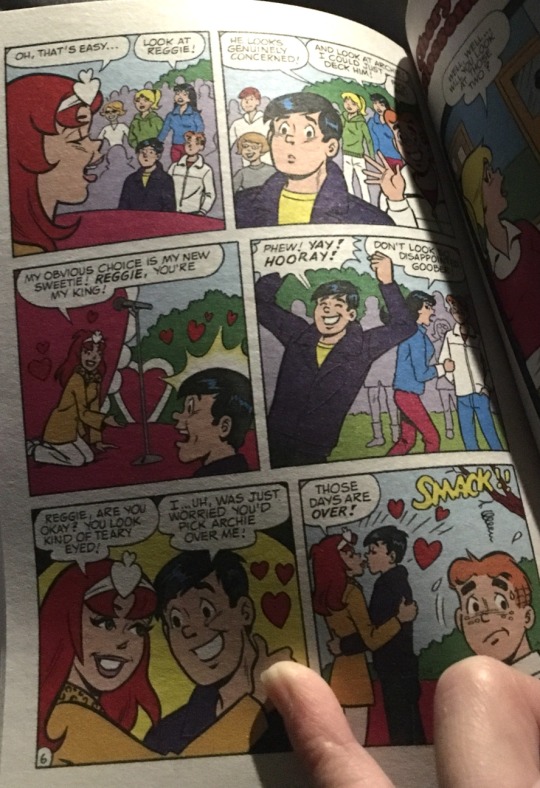
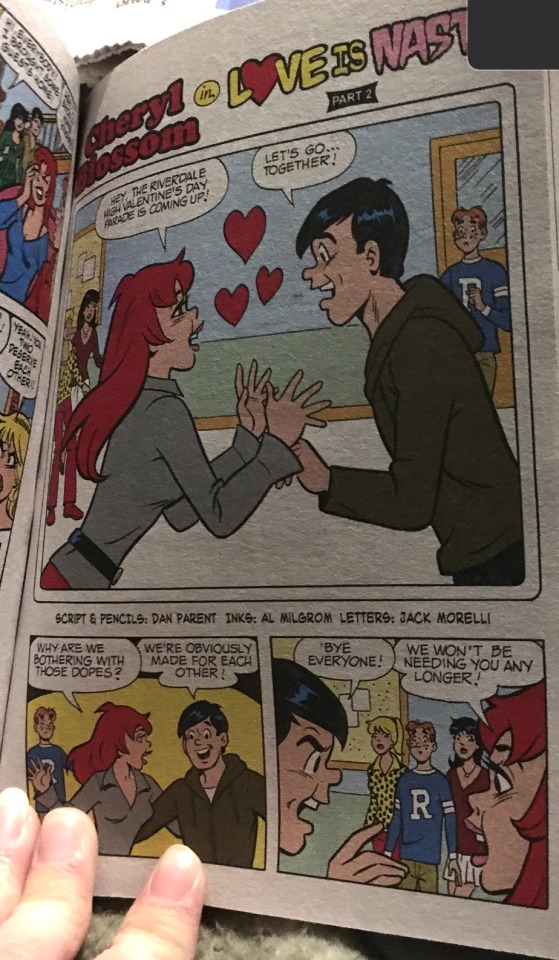
Reggie helps Kevin dress for the dance and his mystery date

Riverdale Shore.
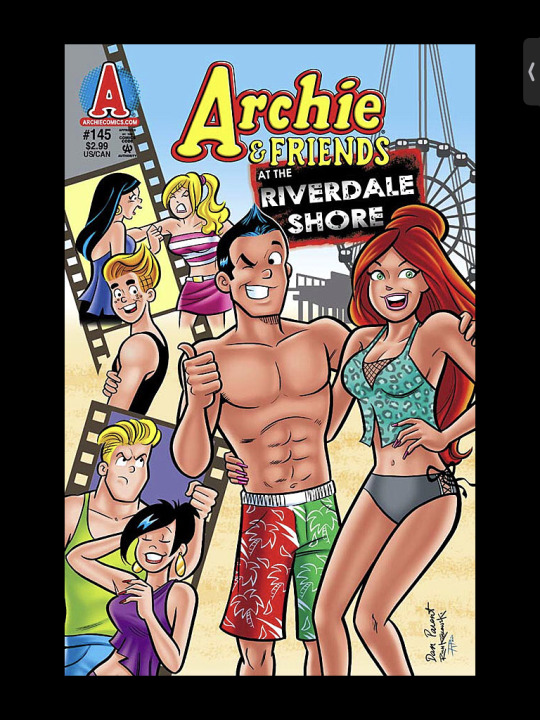
Cabot vs Lodge


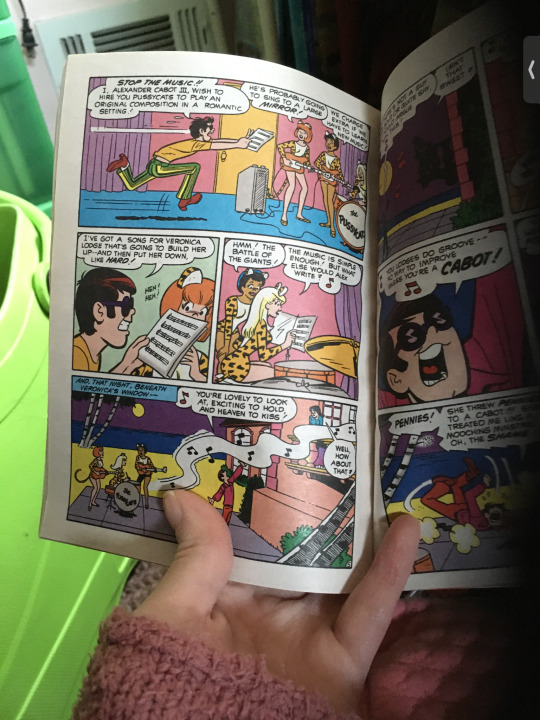
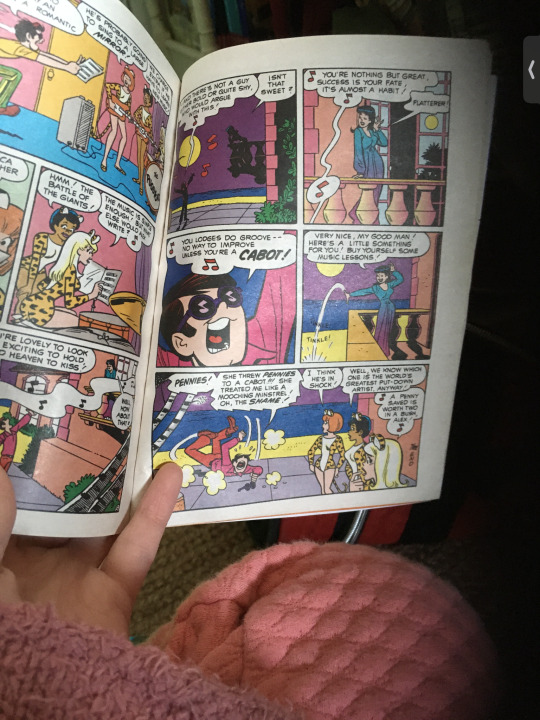
I think all this pretty much illustrates my point. Archie comics equals Disney sitcom all by itself.
23 notes
·
View notes
Photo

Books read in September
I had a moment of intense self-centredness and, internally, wailed: Why isn’t the world filled with more books that appeal exactly to me???
I’ve concluded that it’s like I have an inner story-troll sitting inside me shouting: Tell me a story! I try to appease it by presenting it with books, one at a time, and seeing how it reacts.
Favourite cover: Flyaway.
Reread: The Shadowy Horses by Susanna Kearsley. (I also reread From All False Doctrine at least twice.)
Also read: The Disastrous Début of Agatha Tremain by Stephanie Burgis and Snow Day by Andrea K Höst.
Still reading: The Time-Traveling Popcorn Ball by Aster Glenn Gray and The Game of Kings by Dorothy Dunnett,
Next up: I have borrowed The Other Side of the Sky by Amie Kaufman and Meagan Spooner, Taking Down Evelyn Tait by Poppy Nwosu, and Between Silk and Cyanide: A Code Maker’s War, 1941-45 by Leo Marks. And maybe I’ll finally get around to The Dictionary of Lost Words by Pip Williams?
*
The City of Brass by S.A. Chakroborty (narrated by Soneela Nankani): I think this Middle East-inspired fantasy was just not the story I was in the headspace for -- it was longer, with more complicated worldbuilding and fewer answers. Possibly I’d have followed the political intrigue of Daevabad better had I read this in one gulp (I got halfway through the 20-hour-long audiobook before it was due back and I read other books before picking up the ebook). I liked the two protagonists, enough that I’m curious about what happens to them next, but the second book is 23 hours long and undoubtedly won’t resolve everything either. Maybe another day.
Tuyo by Rachel Neumeier: Ryo is left as a “tuyo” -- a sacrifice to be killed by an enemy -- as a sign that his tribe will withdraw from the Ugaro’s war with the Lau. But his captor doesn’t want to kill him, he wants Ryo to help him stop the war. Neumeier effectively creates tension between people who are polite, honest and honourable, and shows an intriguing relationship, defined by mutual respect, fealty and something more familial. There’s also some unusual magically-defying-physics-as-we-know-it worldbuilding but apparently I was far more interested in the character dynamics. I enjoyed this. Sequel, please?
From All False Doctrine by Alice Degan: My favourite book this year! Toronto, August 1925. Elsa Nordqvist, who hopes to write her MA thesis on a recently-discovered Greek manuscript, is at the beach with a friend when they meet two foster-brothers. This meeting deftly sets up everything which follows. The cover says “A Love Story” but this is also like a cross between a Golden-Age mystery novel and a fairytale retelling, with bonus academia and Anglicanism. I really like how much these characters value their friendships, their lively, intelligent and often honest conversations, and the way the romance unfolds. It also feels like a story written just for me and a hard one to review because my reaction has been very personal.
The Haunting of Tram Car 015 by P. Djèlí Clark (narrated by Julian Thomas): Set in the same city as A Dead Djinn in Cairo, this novella follows two agents from the Ministry of Alchemy, Enchantments and Supernatural Entities as they investigate a possessed tram car. The world-building is vivid and cleverly, thoughtfully, imaginative. But, perhaps because of the mood I’m in and because this story isn’t interested in exploring the personal lives of its detectives, I have no feelings about this.
The Angel of Crows by Katherine Addison: Sherlock Holmes wingfic involving Jack the Ripper murders. Not what I’m looking for in a Holmes retelling. But I was sufficiently intrigued by something the author wrote. I really like Crow and Dr Doyle (arguably more than their original counterparts). My interest wavered a bit during the second half. It closely mimics the style and structure of the original mysteries in many ways and that’s not my favourite style. I wanted fewer cases to solve, and more of Crow and Doyle interactions. I liked the ending, enough to be glad that I hadn’t given up halfway through.
Making Friends with Alice Dyson by Poppy Nsowu: Australian YA. Alice plans to spend her final year of high school staying invisible and studying hard, but is thrown into the spotlight after someone posts a video of her dancing with Teddy Taualai. I loved how intensely this captures Alice’s emotions and perspective, and how the story explores that people have different emotions, perspectives and needs. Alice seems to me like someone who might be on the autism spectrum -- and whether or not that’s what the author intended, it’s great to see characters like her represented. I wish it had unpacked her relationship with her parents more, but that didn’t negate how much I enjoyed this.
Always and Forever, Lara Jean by Jenny Han (narrated by Laura Knight Keating): I can’t remember why, after I read To all the boys I’ve loved before and P.S. I still love you in 2017, I decided against reading the third book. It turned out to be my favourite. I loved it! I had a different experience of finishing high school and applying for university, but I find Lara Jean’s perspective intensely relatable: she has strong opinions about aesthetics; she’s nostalgic, introspective, stressed by uncertainty; she enjoys spending time at home with her family. I liked how this book captures her wonder at the intimacy of knowing another person well, and how, although she sometimes worries about their future, she has very few doubts about Peter himself. I haven’t come across very many YA novels in which a teenage girl is so secure being in a relationship.
The Rose Garden by Susanna Kearsley: After her sister dies, Eva stays with family friends in Cornwall, where she and Katrina spent summers years ago. I wasn’t expecting time-travel. I like time-travel stories, and I like how Kearsley handles it here. Eva’s choices make sense, given her situation, and the story emphasises that, even though she cannot control when she travels in time, there are still many choices she can actively make. So Eva becomes fascinated with 1715, because of the people she meets there and the relationships they develop... but I wanted to spend more time in the present-day Trelowarth, with its rose gardens and new tea room.
Flyaway by Kathleen Jennings: After she receives a mysterious note, nineteen year old Bettina flouts her mother’s rules for ladylike behaviour and embarks on a roadtrip with a couple of forgotten friends in search of her brothers, who disappeared three years ago. I loved some of the descriptions, especially seeing a rural Australian setting for this sort of fantasy. Jennings creates a wonderfully eerie atmosphere and the mystery kept me reading. However, the folktale parts of the story are dark, uncomfortably so. Very successfully Gothic, just ultimately not really my brand of Gothic.
The Duke Who Didn’t by Courtney Milan: There’s something so incredibly soft about this romance -- yet at the same time, it’s about two people who work fiercely towards their goals, worry about things, and are acutely aware of the discrimination they and other they love face as Chinese people in late 19th century England. Chloe and Jeremy’s relationship is characterised by banter and gentle teasing that reveals just well they know and accept and care about each other. Moreover, they have friends and relatives -- and a community -- who are supportive. I really enjoyed reading this and appreciated how low-angst it is.
The Threefold Tie by Aster Glenn Gray: Very tender. The characters convinced me that they were capable of communicating honesty with each other and making an unconventional relationship work. I liked the prose, which is no great surprise.
Hamster Princess: Whiskerella by Ursula Vernon (aka T. Kingfisher): This time, adventure finds Harriet at home: her parents are throwing a masked ball so she can “meet some nice young princes without terrifying them”. But the princes are all preoccupied with a beautiful stranger, and Harriet is distracted by the mystery: who is this hamster, how did she get in without an invitation and what sort of magic is behind her glass slippers? I think this is my favourite of Harriet’s adventures (so far). I loved the humour in this one.
Echo North by Joanna Ruth Meyer: When Echo finds her missing father unconscious and half-frozen in the woods, she is given a choice by the white wolf. A retelling of “East of the Sun, West of the Moon” with elements from “Beauty and the Beast” and “Tam Lin” thrown in, this has so many things which appeal to me, including an unexpected and wonderful library. Yet I found it frustrating and slow; the prose and the characters are rather straightforward, and I predicted nearly all the twists (bar the finale). But I believe that this tale could delight a younger, or a less critical reader.
The Disastrous Début of Agatha Tremain by Stephanie Burgis: In the two years since she turned sixteen and dismissed her governess, Agatha has been free to disregard ladylike behaviour, studying the books in her father’s library and teach herself magic. But then her aunt arrives and insists upon Agatha making a social début. This novelette is another story that I suspect I’d like more if it had been longer, if some of its ideas had been expanded upon and some of the relationships been given more space to develop. Agatha’s aunt and her motivations were unexpected, and I wasn’t entirely comfortable or satisfied with how that was resolved.
Snow Day by Andrea K. Höst: This novelette takes place after the Touchstone trilogy, more specifically after In Arcadia. Two outsiders get to see Cass and her family on Snow Day, and reveal a bit about their upbringing on Kolar. This feels very much like fanfiction which just happens to be written by the author. It is fun to see familiar characters through others’ eyes and the expanded worldbuilding is interesting, but as a narrative, it seemed somewhat incomplete. (Maybe she’s planning something more with these characters?)
#Herenya reviews books#Rachel Neumeier#Alice Degan#Katherine Addison#Poppy Nwosu#Susanna Kearsley#Ursula Vernon#Joanna Ruth Meyer#Jenny Han#Katheen Jennings#Courtney Milan#P. Djèlí Clark#Stephanie Burgis#Andrea K Höst#S. A. Chakraborty#Aster Glenn Gray
13 notes
·
View notes
Note
what books did u get ? i rly need to get back into reading more now school is over
oh man. so I’ll give you what I bought & then I’m also gonna throw in some similar books that I have already read just because I can actually vouch for the quality of those
(brief note that my main qualifications when I was looking for books, besides not wanting YA, was that 1. they were not about straight cis white men and/or 2. they had particular appeal to one of the areas of sf&f that I have a particular fondness for and/or 3. they cost under five bucks. so there’s a lot of diverse lit, and a lot of novellas, and a lot of urban fantasy wizards who are also detectives/rebellious angels and or demons/necromancy/dragons/stuff that is explictly Lovecraftian adaptations but takes the piss out of Lovecraft/anything on this list/anything published by Tor)
new books that I have read:
(coming back to update this as I get through these books)
the Lovelace & Wick series by Jennifer Rainey – this is the Demon Husbands one I’ve been yelling about. Two gentleman demons in love – a Faustian tempter and a bringer of catastrophes – are growing increasingly dissatisfied with the work they do for hell, while also being forced to contend with new and dangerous enemies. Set in a vaguely-steampunk 1890s Massachusetts. Also includes monster-hunting steampunk scientist lesbian wives.
Deadline by Stephanie Ahn – fourteen months after a disastrous failed ritual, disgraced blood witch Harrietta Lee gets offered a ridiculously lucrative job quietly recovering a stolen artifact for a young member of a powerful magical family, and promptly finds out that this is too good to be true. Also she keeps meeting scary, hot women. Instantly the only wisecracking urban fantasy PI named Harry that my heart has any room for. (This one’s a bit Spicier than my usual fare but the author actually includes a list of content warnings including page numbers at the front of each book, which you can view with the preview option on the Amazon page.)
Hammers on Bone by Cassandra Khaw – A kid hires London PI John Persons to kill his stepfather. The first catch is that the stepfather is a Lovecraftian horror. The second catch is that Persons is too. This is like, the noir-est horror I’ve ever read and that’s something I am very into.
The Haunting of Tram Car 015 by P. Djeli Clark – An urban fantasy police procedural set in an alternate 1912 Cairo, in which two government officials are sent to deal with a strange, malevolent spirit in the midst of political upheaval as Egypt’s women demand universal suffrage. There’s a free short story prequel to this on tor.com called “A Dead Djinn in Cairo“ that’s worth reading first.
Three Parts Dead by Max Gladstone – high fantasy with a black protagonist, in which Tara Abernathy, a disgraced magic user and rookie associate in an internationally renowned necromancy firm, is assigned to resurrect a city’s murdered patron fire god – but first, with the help of a chain-smoking priest and a vampire-addicted servant of Justice Herself, she has to track down his killer.
River of Teeth by Sarah Gailey – in an alternate history where the 1910 “Hippo Bill” passed, Winslow Remington Houndstooth, an ex-rancher out for revenge, is hired to travel north with a ragtag crew – a con artist and pickpocket, a demolitions expert with a proclivity for poisoning, the most dangerous contract killer in the country, and the very man who ruined his life – and take on the dangers of the massive swamp that was once the Mississippi river, a place ruled over by deadly feral hippos and a homicidal riverboat gambling king.
or, essentially, a swamp-based heist Western with a cast including a British-East Asian bisexual man, a black nb person, an unashamedly fat woman, and a pregnant Latina lesbian, and also their pet hippos. Listen just go ahead and get the version with both stories in it
Silver in the Wood by Emily Tesh – Tobias has lived in the woods as long as anyone can remember; long enough that the nearby town tells stories of the Green Man, the spirit-king of the forest, who dwells in the trees. These stories are truer, and far more dangerous, than anyone but Tobias knows – so when friendly, handsome, curious Henry Silver buys up the neighboring Greenhollow Hall and starts investigating the local folklore, Tobias will have to decide whether to sacrifice the only life he has known for centuries, or the first person he has loved in all that time.
not-new books that I have read:
idk if you don’t know about the Wayfarers series, the first of which is The Long Way to a Small Angry Planet, but it is an absolutely stellar bit of sci-fi very much based around ideas of found family and discovering your own identity and place in the universe and love and compassion and stories based around sweet slice-of-life stuff in a scifi universe with lots of fun aliens and it is so very queer and so very heartwarming and all three books (which each have different casts, although the characters in all three are connected to one another and sort of cameo across all the books) are fantastic.
Urban Dragon by J.W. Troemner – Dragons are supposed to be ruthless, unpredictable, deadly, selfish creatures. So why is it that Rosa Hernandez seems to be able to keep her best friend Arkay in check? How did Arkay, a shape-changing dragon with lightning at her command, end up being found alone and starving and with no memory of her past by a homeless woman? And as evidence mounts that someone is hunting down supernatural beings, who can they trust? (I stumbled across this while looking for urban fantasy on TV Tropes and BOY am I glad I did. Good if you like close friendships between queer women or the enemies-to-lovers trope)
The Merry Spinster by Daniel Mallory Ortberg – of course I was going to read Daniel Ortberg’s short story collection, are you kidding me. Not “””darker””” fairy tale retellings, but fairy tales as often very surreal, psychological horror. Read this if you want to totally ruin “The Velveteen Rabbit” for yourself.
The Golem and the Jinni by Helene Wecker – historical fantasy set in the early-20th-century Orthodox Jewish and Middle Eastern immigrant communities of NYC, about the strange friendship that springs up between a bitter jinn trapped in a mortal body and a masterless golem living among humans. and it gave me feelings.
The Ballad of Black Tom by Victor LaValle – a retelling of H.P. Lovecraft’s short story “The Horror at Red Hook” from the perspective of a black man. One of the better pieces of horror I have ever read.
Lovecraft Country by Matt Ruff – a very different take on a similar concept to The Ballad of Black Tom, wherein a mid-century black Midwestern family find themselves mixed up in the plans of a bunch of cultists and set out to disentangle themselves from this whole cosmic-horror mess. Apparently Jordan Peele is adapting this into a TV show, so I’m stoked for that.
new books that I have not read:
(& also a couple that are just books I want, and some that I just haven’t read yet but got free from the Tor monthly ebook club, which is very much worth joining)
Armed in Her Fashion by Kate Heartfield– I’m just going to let the official blurb speak for this one because there is absolutely no way I could improve on it
The Black God’s Drums by P. Djeli Clark – New Orleans-based steampunk fantasy about an airship captain and a stowaway who talks to orishas.
Rupert Wong, Cannibal Chef by Cassandra Khaw – Apparently several authors have written standalone works in this series, and Cassandra Khaw’s aren’t chronologically the first, but I love Cassandra Khaw and “chef for ghouls and pencil-pusher for the Ten Chinese Hells is forced to solve an inter-pantheon murder mystery” just sounds so good to me.
Bones and Bourbon by Dorian Graves – Cursed half-huldra PI is forced to help out his little brother and the demon who shares his body, and then everything goes wrong. Feat. carnivorous unicorns.
Labyrinth Lost by Zoraida Cordova – reluctant bruja attempts to rid herself of her magic and instead plunges her entire family into magical trouble. YA.
Robbergirl by S. T. Gibson – WLW retelling of The Snow Queen from the perspective of the bandit princess. YA.
Passing Strange by Ellen Klages – slightly-fantastical historical lesbian noir novella set in the burgeoning 1940s gay club scene in San Francisco.
The Black Tides of Heaven by JY Yang – admittedly caught my eye because the cover art reminded me of Moribito, which I adore. East-Asian-inspired epic fantasy which I believe has a nonbinary protagonist.
Rosemary and Rue by Seanan McGuire – I’ve been neglecting getting around to October Daye way, way too long considering how much I love Seanan McGuire and urban fantasy, but my mom started reading this and that pushed me over the edge because damn it, yes I want to read her take on the Wizard Detective genre that I have such a weakness for.
The Traitor Baru Cormorant by Seth Dickinson – this was recommended to me in a Tumblr post listing interesting, diverse fantasy, and I’ve been into high fantasy political intrigue lately.
The Paper Magician by Charlie N. Holmberg – came across this in a Twitter thread about fantasy worlds with unconventional and interesting magic systems. A newly graduated student of magic is bitter about being sent to learn paper-crafting magic rather than working with metal, until Murder Stuff Happens. YA.
Miranda in Milan by Katharine Duckett – queer fantasy sequel to The Tempest, with Miranda as protagonist.
Witchmark by C. L. Polk – post-WWI gaslamp fantasy MLM romance about a male witch in hiding, working as a doctor; the reviews seem to indicate people think it’s more ‘delightful’ than ‘literary’ but apparently it is pretty fucking delightful.
In the Vanisher’s Palace by Aliette de Bodard– East Asian WLW retelling of Beauty and the Beast and also one of them is a dragon.
Winter Tide by Ruthanna Emrys – another one of the rash of new Lovecraft adaptations that are turning perspectives around, this being one where the citizens of Innsmouth are the protagonists. Also has a really good short story prequel you can read for free on tor.com.
also I just feel like mentioning that I’m stupidly excited for Gideon the Ninth by Tamsin Muir to come out this fall because the review they’ve decided to put at the top of every blurb is “Lesbian necromancers explore a haunted gothic palace in space!” (not my exclamation mark) and I don’t know how anyone could more perfectly craft something to my tastes.
34 notes
·
View notes
Text
Book Roundup -- March 2017
The Gilded Cage by Vic James. 2/5. This book really bothered me, because it started out strong. Essentially, it’s a dystopian/urban fantasy story in which the UK is run by the Equals, who are Skilled--magically empowered. Those without powers are required to put in ten years of slavery, though once they’re eighteen they get to choose when they do their years. Luke is sent to what’s basically a workhouse, whereas his sister Abi and the rest of their family is sent to work relatively cushy jobs at the manor home of one of the ruling families. This was all very interesting, except Luke’s storyline rapidly became a typical rebel against the machine dystopian story, while Abi was discovering the secrets of this fucked up family--until she fell in love with the Boring Brother. Nope. Nah. There were a million viewpoints as well, and ultimately too many cliches.
Daughter of the Pirate King by Tricia Levenseller. 1/5. I feel bad about giving this a bad rating because its cover is adorable and the author seems nice. But I can’t pull punches with this one. Basically, this is about Alosa, the titular daughter of the pirate king who lets herself get kidnapped by lesser pirates in order to steal a map. The idea sounds like fun fare, and I wasn’t looking for anything super historically accurate or intellectual. I was expecting something POTC-esque. But like... Elizabeth Swann at least cared about functionality. Within the first thirty pages, Alosa had gone on and on about her clothes and her need for corsets and I was like listen girl I’ve worn corsets you’re not swashbuckling in that shit??? Like I’m all for weaponized femininity but no??? The whole thing read as parody or satire, which I’m cool with too, BUT IT WASN’T FUNNY. Every bit of dialogue was flat and delivered in a straightforward manner. Alosa’s inner monologue was boring and every other paragraph felt like an info dump. Just no.
Beautiful Broken Girls by Kim Savage. 2/5. After sisters Mira and Francesca commit suicide together, Mira’s one-time love Ben begins finding notes left in the seven places where they touched. In doing so, he’ll discover why the girls killed themselves. This book gets points for the writing style, which was evocative and lovely. It also has an interesting focus on Catholic ritual, especially stigmata. But honestly, it was just a downer throughout. It’s not that you expect a happy, upbeat book when you’re reading something about teenage suicide (don’t do it!). However, The Virgin Suicides tackled the same subject matter with an air of mystery and depth. These characters all seemed shallow and boring. The book also deals with the issue of pedophilia rather poorly, in my view. It romanticizes the survivor as “damaged” and “broken”, and it’s just... not well done. Good idea, poor execution.
The Beast is an Animal by Peternelle van Arsdale. 2/5. Essentially, this is the story of Alys, who, after an encounter with the soul-eating twins outside her village, feels connected to them as she grows up. The soul-eaters are feared by her village, as is the terrifying Beast. After discovering that she has certain powers, Alys must balance her village’s fear of witchcraft with her own desire to get to the bottom of the twins’--and the Beast’s--origins. I felt zero connection to this story, which disappointed me greatly because the first few pages were so compelling. I just didn’t care about Alys--I wanted to know more about the twins. The prose was lovely, but everything was far too internalized for me. I’m sure some people would love this, though!
Missoula: Rape and the Justice System in a College Town by Jon Krakauer. 4/5. Clearly, I was going through a reading slump. Therefore, I picked up something completely different. Krakauer is a very good writer; but I’m not going to lie, I was worried about this. I’m always hesitant when men choose to write about the sexual assault of women--it can be botched very quickly. Krakauer, towards the end of the book, owns up to his own privilege and ignorance, which I appreciated. He approaches the topic with sensitivity; he interviews the rapists when possible; but he doesn’t pretend that he isn’t biased, and here that is good. Krakauer believes in these women, he supports these women--whether or not their rapists were found guilty in court. This is extremely difficult to read and quite graphic, but worth the time. A revealing look at rape culture in America.
Long May She Reign by Rhiannon Thomas. 3/5. This tells the story of Freya, twenty-third in line to the throne when most of the royal court--including everyone in line ahead of her--is poisoned at the king’s birthday celebration. Suddenly queen, Freya must not only deal with adjusting to a role she thought she’d never have, but the issue of who assassinated so many nobles, and what they’ll do next. This book had a great premise; it approached relationships in a different way that I suspect will appeal to readers tired of romance; and it gave us a likable protagonist. But I think it just read too young for me. Freya is interested in science, which means that she spends much of the book trying to solve the murders like she’s a cross between a mad scientist and a detective. I was more interested in the courtly goings-on, and that side of things didn’t ring true for me. But it wasn’t bad. We just didn’t gel.
Hunted by Meagan Spooner. 4/5. This Beauty and the Beast retelling is peppered with Russian folkore, and gives us our Beauty in Yeva, a young huntress whose father goes missing in the woods. Upon discovering his body, she is taken captive by the Beast he was tracking, and finds herself imprisoned. I could say more but it would spoil a lot; this story is definitely very much a fairy tale take on BatB. Retellings have been hot for the past couple of years, and it was nice to see one that more along the lines of Robin McKinley than Sarah J. Maas, though both have their places. Spooner’s writing is lovely and lyrical--and she tackles some of the darker aspects of the original fairy tale sensitively. (Yes, she confronts the Stockholm Syndrome issue.) It may not reinvent the wheel, but it’s engaging and well-written, with a smart heroine and a legitimately scary beast.
What Alice Forgot by Liane Moriarty. 4/5. After hitting her head a the gym, Alice loses the past ten years of her memory. She thinks that she’s twenty-nine, happily married, with her first baby on the way. In fact, she’s thirty-nine, about to be divorced, and a mother of three. Not only is her relationship with her husband Nick terrible; she’s also barely speaking to her sister Elisabeth and barely recognizes herself. Moriarty has a great way of being both entertaining and kind of good at navigating the human psyche. Her characters are all flawed, all realistic--Alice and Nick’s issues are real ones, and they aren’t easily fixed. Not gonna lie, as someone who recently watched her parents go through a hideous divorce, this was difficult to read at times. But I was also pulling for Alice and everyone she loved to make something good of their lives, because they were endearing, they were people you wanted to see happy. Moriarty is good at slowly unfolding reveals as well, and I didn’t expect one issue in Alice and Nick’s marriage to be what it was--but it was much more nuanced than what I’d been assuming. At times this got a little corny, of course, and it’s not quite as edgy as Big Little Lies. But I really enjoyed it.
The Second Mrs. Hockaday by Susan Rivers. 3/5. Seventeen-year-old Placidia marries thirty-two-year-old Confederate Major Gryffth Hockaday right after meeting him; she’s somehow compelled by him, and he needs a mother for his infant son following the death of his first wife. The pair spend two nights together, during which they quickly fall in love--only for Hockaday to be called back to war. After over two years’ absence, he returns to find Placidia much changed, and rumor has it that she both bore and killed an illegitimate child while he was gone. The book is in the format of letters and Placidia’s diary entries, slowly telling the story of what actually happened while Hockaday was away. The morality here is very gray and nuanced; in many ways, what actually ended up happening was more mature than what I expected. (Although one aspect of the story--a crucial aspect--I found so obvious that the reveal wasn’t even really a reveal, and that was... disappointing, not gonna lie.) While it’s definitely a compelling read, I had to dock it from four to three stars because I felt like Rivers gave a pretty dated portrayal of slave-master relations in the book. It felt very “Gone with the Wind”. Placidia owned these people, but the realities of that were kind of glossed over, and some moments felt very “happy slave” to me. It’s worth the read for the mystery, but other aspects could have been much better.
The Virgin Suicides by Jeffrey Eugenides. 4/5. After thirteen-year-old Cecilia Lisbon commits suicide, her four sisters become gradually more sheltered by their parents, leading to eventual disaster. The events are narrated--rather creepily--by a chorus of neighborhood boys obsessed with the Lisbon sisters. This story is probably familiar to you; but if you haven’t seen the movie yet, read the book first. Both are great, but the movie is actually very faithful to the plot and feeling of the book, so I feel like I lost something by seeing it first. Like, definitely see it, it’s a great movie. Just read this first. Eugenides gets the weird, obsessive natures of teen boys so well--and the Lisbon girls just kind of destroyed me.
In Cold Blood by Truman Capote. 4/5. In 1959, four members of the Clutter family were brutally murdered in Holcomb, a small Texas town. Deciding to try out a new style of creative non-fiction, Truman Capote traveled to Holcomb, getting to know who the Clutters were, the investigators, and most importantly, the murderers--Perry Smith and Dick Hickock. Capote’s following of the case and the eventual captures of Smith and Hickock would become “In Cold Blood”. This book is honestly more disturbing than I thought it would be. I’m into true crime, but something about the way Capote writes just hammers home exactly how chilling these murders were. At the same time, it’s clear that he had a lot of sympathy for the devil--specifically, Perry Smith. Part of what makes this book so fascinating Capote himself and the way he chooses to portray things.
A Year Of Ravens by Stephanie Dray, Kate Quinn, S.J.A. Turney, Vicky Alvear Schecter, Russell Whitfield, and E. Knight. 4/5. This collaborative novel tells seven separate stories, all surrounding Boudica and her rebellion. From Roman soldiers to druids, a variety of different perspectives are given, shedding light on the grayness of the rebellion. I can’t really call this an anthology, because everything is connected and works very well together. The only one of these authors that I consistently read is Kate Quinn (her entry to the novel is one of my favorites, of course) but everyone did at the very least a decent job. The only story I didn’t connect with is Russell Whitfield’s story of Agricola, a Roman tribune--but that’s not his fault, and it didn’t take away from my enjoyment of the novel as a whole. Kate Quinn’s The Warrior is super interesting, focusing on an aging champion of Boudica’s and a Roman woman he took as a slave during the rebellion; E. Knight’s The Daughters is just heartbreaking and excellent, telling the dual perspectives of Boudica’s daughters; and Stephanie Dray’s The Queen is also especially memorable in that it tells the story of Cartimandua, a client queen with a story very parallel to Boudica’s. As a whole, I definitely recommend checking this out if you want some fast-paced, surprisingly intelligent historical fiction.
A Song of War by Kate Quinn, Christian Cameron, Libbie Hawker, Vicky Alvear Schecter, Russell Whitfield, Stephanie Thornton, and S.J.A. Turney. 4/5. Another collaborative novel by the same team (give or take a few members), this tells the story of the Trojan War, from Paris and Helen’s elopement to the fall of Troy. Again, it’s in seven parts, told from the perspectives of everyone from Odysseus to Cassandra and Philoctetes, avoiding some of the more traditional viewpoints of Hector, Paris, Helen, and Achilles. In some ways, I found this story more engaging than that of “A Year of Ravens”. Maybe it’s just because I’m more interested in the Greeks than the Britons, but there was something about this book that was so... tragic. Without beating you over the head with sadness. It was very gripping, but there was a sense of doom throughout each story. For the most part, I found it to be pretty evenly split between the views of the Trojans and their allies and the Achaeans. With a couple exceptions--Paris and Helen are portrayed in a really unflattering light. I see why, and Helen had enough pathos where I... got it. (She was Helen by the way of Cersei, in my opinion.) But the characterization of Paris bothered me. It seemed pretty shallow, and honestly I’m kind of tired of Paris being portrayed in a straightforward, cowardly manner. His backstory lends itself to some really interesting issues, and I feel like the traditional “ugh Paris stealing women and shooting people with arrows nOT FIGHITNG LIKE A MAN” reeks of toxic masculinity. On the other hand, Achilles, who usually is either glorified to hell or trashed, gets a really nuanced depiction here. I kind of just wanted everyone to get that, and for the most part a lot of people did; so the whole “pretty snakelike girly man archer Paris” thing really stood out as weaker characterization. He doesn’t have to be great, but like... I don’t know, isn’t there something compelling about someone who’d be smart enough to take everyone out via arrows but dumb enough to start a war over Helen? Just my take. With all that being said, I still really enjoyed the book and recommend it to anyone who’s interested in the Trojan War and fast-paced historical fiction.
The Confessions of Young Nero by Margaret George. 1/5. This is the fictionalized beginning of Nero’s life, from his first memory to his second marriage--and it’s actually going to continue with a sequel, which needless to say I will not be reading. Honestly, I think I’m done with Margaret George. I love her “Memoirs of Cleopatra” and really like “Helen of Troy”. But I couldn’t stand this book. I won’t pretend to be an expert on Nero, and maybe he wasn’t as bad as he’s cracked up to be... But I’m also pretty sure that he wasn’t the constant victim George presents in this book. At like, three, this kid is critiquing the political moves and morality of Messalina. (Who is presented in a stereotypical manner, as is Agrippina the Younger.) He’s never the one at fault; people always do things without his permission, especially if they’re female. (Excepting his lover, Acte, who I assume was an original character?) The thing is that as this is a fictional autobiography, Nero not being aware of his own faults makes sense, especially if he’s mad. But George does the same thing here that she did with her “The Autobiography of Henry VIII”--except she might take it further here, it’s been a while since I’ve read the older book. Even when we see the perspectives of others, they’re just like “poor Nero, being led astray by X vile woman”. And I just... He’s the fucking emperor, let’s get real about how much responsibility he may or may not have had. It was boring at some points and offensive at others, and honestly, I’m kind of disturbed by how eager George is to leap to the defense of powerful men who victimized and killed the less privileged.
Love and Gelato by Jenna Evans Welch. 2/5. Upon the death of her mother, teenage Lina is sent to Florence, Italy, to live with Howard--the father she’s never before met. Soon after her arrival, she not only meets a boy--the charming Ren--but is given her mother’s journal, which should answer the questions of what happened prior to Lina’s conception, and why her mother never told her about Howard. Basically, I expected a fun, beachy read from this. The author apparently spent her high school years in Florence, which to me added a certain level of authenticity--in theory. Maybe her Florence was different from mine; but nothing about this fault authentic. Especially the part in which Howard took Lina to a pizzeria right outside the Duomo. I don’t buy a guy who’s lived in Florence for nearly two decades giving a girl her first pizza at the Duomo. I went to a pizzeria outside the Duomo once and literally had pizza in Piazza del Duomo again. Aside from that snobby little gripe, I found Lina pretty irritating--yes, she was going through a lot, but she seemed to be super dismissive of the experience of living in Florence--and I guessed the twist like... Thirty pages in? Maybe others would enjoy this, but it’s not for me.
Book of the Month: A Year of Ravens.
2 notes
·
View notes
Text
Tru’s Writing Notes
I’ve had people ask me after seeing my feedback on stories if I’m as overanalytical with my own stuff. The answer is yes. My stuff may often be written at 4 AM and typo-laden, but yes.
Because of that and @thesecondsealwrites talking about process (though unlike her post, this is more the why/how than the everyday practicalities of writing), here are some of the notes I’ve left myself in my journal. These apply mostly to the way I write my original rather than my fic, but they can apply to both. Can I add: a lot of these probably seem very obvious, I know, and I don’t always manage to bear them in mind. Also, I’m not a pro or even a talented amateur, and these aren’t addressing an audience, they’re addressing me - and they apply more to the way I write than writing in general. But if anyone might find this interesting or wants to know if I worry about my writing, here’s your answer.
People tend to like a strong story, with good reason. The best plots tend to be simple, and then you build outwards and maybe twist. A compelling central arc, certain genre tropes or something familiar tend to be what work: forbidden romance, or an unsolved murder and a maverick. We have a fair idea of what’s going to happen, but it’s the anticipation - and/or the eventual subversion - that brings the fun. Plot and drive.
Again, try to have a strong idea of where it’s going, or the spirit of it. Terry Pratchett once said that you want to be able to write your own blurb: it’s a good sign if you can distil the essence of your story into a hundred words or so.
Just like real people, characters have verbal tics, peculiar turns of phrase and certain mannerisms. Learn them, and use but don’t overuse. Keep it natural.
Some people just don’t like present tense, or past, or first person, for whatever reason. You may be buggered from the start, and sometimes all you can do is try. Try and know your audience, try your best. Try not to bang your head against a wall.
However, present tense is a slippery bastard. At its best, there’s almost nothing that can match it for immediacy and visceral intensity. At its worst, it can either be staccato, bleak and overly clinical - or at the other end of the scale, it can be overwrought sensory overload. Either way, a reader will be put off. Ideally, I try to balance the two and end up somewhere in the middle: punch and verve, but with restraint and room for the reader to infer. I rarely manage this, but God do I try.
Speaking of inference: don’t assume the reader is an idiot. Sometimes the best punchline or explanation is the one that’s never given. Myself, my favourite horror stories are the ones that don’t go for shlock and shocks: they’re the ones where I finish them feeling mildly unsettled, go and do the washing-up while my mind puts the pieces together, and then go, five or ten minutes later, “Oh God, it was behind the door the whole time! That’s... Argh.”
People are terrifyingly complicated. Every reader brings something to the text, whether they’re aware of it or not. This can add unexpected beauty or poignancy, but it can also make implication, idioms, dialect and offence into total minefields. People can come out with things that would never have occurred to you. Something might fly over someone’s head, or something might turn out to be an incredibly offensive phrase in their country and perfectly innocuous in yours; someone might find your happy ending the most depressing thing in the known universe, and someone else might hate your likeable romantic hero because he reminds them of their arsehole ex. Sometimes you can anticipate this and take countermeasures for clarity’s sake; often you don’t need to because theirs is a perfectly valid interpretation and part of the joy of making a cake is seeing people eat it; and mostly you just can’t know, because people come in so many different permutations and you’re not actually psychic, so leave them to it. Gah.
Watch your tenses. Things like flashbacks are nightmare territory and ripe for grammar slippage. Never be afraid or too proud to read up on usage.
Same with semicolons. Tricky little gits.
People mangle language. Doesn’t matter whether you’ve had the “perfect” education, everyone does it at least sometimes. People lose words, misuse vocabulary (me, all the time), go for double negatives, mix metaphors. You always want your dialogue to be readable, and you don’t want your portrayals to be hackneyed or offensive, but it’s generally unnecessary to aim for perfection in dialogue unless it’s for effect: say, if you want to make a character less approachable, if you want to show they’re not human, or if rose-tinted dialogue is a stylistic choice. Generally, true-to-life dialogue is inherently descriptive rather than prescriptive.
Sometimes said mangling leads to fascinating new quirks, dialect and expressions.
Speech is very different from thought. A character’s narrative voice is often quite different to their dialogue voice. Thought is much faster than speech, and sometimes someone will answer their own question before they’ve finished saying it. Thought is by nature more disjointed, and thought is also a monologue, unless everyone’s suddenly turned telepathic or you’re dealing with dissociation/multiple personalities. In contrast, speech has a listener, which changes it. Nerves can make phrases choppy or make them fail completely. Often people interrupt each other. Realistic dialogue should reflect this.
On a similar note, let your characters talk. Know where to draw the line - no-one wants the tension ruined by a half-hour conversation about socks - but very few people are all business or all dramatic emotion all the time. (Those who seemingly are will have reasons for it, and those are often worth exploring, too.) Unless you’re on a particular word and/or time limit, let your characters occasionally be real people whose eyeliner runs, or who dislike artichokes, or who make bad jokes - and people who don’t revolve completely around your protagonist, with their own internal lives. When done right, relateable is not boring - especially if you’re working in a fantastic or dramatic canon. The odd anchor to reality can grab your heart and tug.
But do know where to draw the line. Let them be enigmatic and heroic when they need to, because often the magic is in that contrast between the epic and the mundane. Characters can do and be what we can’t. Don’t take away all their mystery and more idealised qualities.
There’s no one way to do funny, and there’s no way to write an instruction manual for it. Again, like most other things, it’s a matter of interpretation: everyone’s tickled by different things. But often humour relies on the subversion of expectation - bathos and anticlimax, for example, or giving an established word/phrase an entirely new meaning - or it relies on particular character idiosyncrasies, or on the other side, the utter, crushing fulfilment of expectations. (”Save the world, they said. It’ll be fun, they said.”) A good source of jokes is often that “I bloody knew it!” feeling.
Characters have biases, too. Always try and account for this in the narrative.
Foreshadowing is your friend, and often a key to emotional closure for the reader. Unless you can do some serious, stylish authorial sleight-of-hand, deus ex machina endings will prompt pissed-offness rather than satisfied applause. Even if you don’t introduce your secret weapon/s early on - best right near the beginning, if possible - at least get the key themes and characters down. You want to get an, “Oh, of course,” not “Well, that was a total arse-pull.”
Screenwriters sometimes talk of an A-plot and a B-plot. The A-plot’s the main one, and B is a seemingly separate subplot that inevitably turns out to be all tangled up with A. It’s pretty standard for detective dramas: there’s a murder, they start investigating, and the seemingly unrelated corpse on the other side of town always ends up being central to the case. A and B always converge. Often, if it’s a story with depth and a well-reasoned plot, the B plot will grow naturally. Of course, that’s only one way of doing it: some stories have a strong, driving A plot that drives everything and stands on its own, and have some C, D, E, F, so on plots. I admit, I’m not much good at the A + B plot thing, so I don’t tend to do it. If I have subplots, they tend to be less connected and a bit more character-driven, rather than about world-saving/murder-solving like the A plot. (I tend to half-jokingly call these C plots, where the C stands for “character” or “crying.”) Good characters usually write their own C plots - they have ulterior motives, hidden aspects, unexpected connections, and if you let them wander off they’ll make trouble for themselves. C plots are connected to the main plot, but unlike B plots, not a fundamental part of it. Sorry, screenwriters, for the terminology mangling.
Another trick to nick from Hollywood: the meet-cute. Sometimes you want someone to enter the narrative sneakily and unobtrusively, but often, especially with protagonists and love interests, never underestimate the power of a good, memorable character introduction. Audiences remember the ways they meet your characters, and the ways that characters meet eaxch other.
It’s not necessary for every story, but often it’s good to have a rock-bottom moment where everything looks hopeless. It reminds your audience viscerally of the stakes and penalties for failure, and it makes eventual victory even sweeter because it’s against the odds. Unless the light at the end of the tunnel is an oncoming train. In that case, rock on with your downer-ending self.
Often the best plot comes from character. (After all, Greek dramatists went on about this all the time with concepts like hubris and hamartia.) Even when nations clash, nations are run by flawed, corrupt people. Antagonists ought to have strong motivations unless you’re writing senseless violence/cruelty intentionally. So on. People often talk about the heart of drama being conflict, and some people, taking that to heart, write a war or their couple arguing. Yeah, that can work brilliantly, but there are other ways to do it, and conflict can be smaller-scale, too. It can be as simple as different aspects of the same character clashing; for instance, if they’re torn between love and duty (there’s a reason that one’s so popular), or the conflict between their past and present selves.
#writing#tru talks#tru rambles#long post#god i probably sound so bloody arrogant#but did i mention this is mostly me prodding myself and my stories?#not anyone else necessarily
31 notes
·
View notes
Text
aaaa im getting stupidly inspired to work again on my old Dating Sim Ghost Tragedy Game since I had that dumb idea today about a new Dating Sim Ghost Tragedy Game I’ve had like five separate ideas for different tragic undead datey games :P Lets talk about this particular one!! I’m pretty tired so I cant really write it a big post like i did with today’s new idea, but I’ll try my best ^_^
The idea is that it’d be sort of a traditional medieval fantasy setting but its more like a slice of life tale of the regular citizens in these sorts of worlds, rather than a big destined hero thing. Sorta like the appeal of the Atelier series? I’m thinking the protagonist could maybe be a blacksmith or a gardener or some other down-to-earth job? I just feel like he’s a hardworking chill sort of dude, sometimes kinda comes off as emotionless to others, kinda depressed but devoting himself to his work helps him smile again. He’s really passionate about whatever he does! And i think deciding his job would be a big step towards developing this idea, because having it as a minigame would help add structure to the plot and some relief from the sadness. I dont wanna make it too similar to Atelier though... So yeah, the protagonist is this cute mid-twenties relateable fella who’s just trying to do his job. I think I wanna give his outfit dungarees or something? I feel like he’d always look a bit work-uniform-style even when he’s off duty, he’s kinda too lazy to change clothes. A perpetually bored and disinterested guy. Or, at least that’s the impression he gives off to people who don’t know him, he only brightens up around the few friends he has. AND HE PUTS 100% INTO THAT SMILE, GODDAMMIT
And then his childhood friend is someone who actually was sort of a ‘standard rpg hero’, but a really sad subversion of it. At the moment he’s currently the main love interest, and he’s still sorta the catalyst for the plot and the mysteries and all, even if you don’t pick him. or I dunno, maybe I’ll just make it only one love interest but many multiple endings, but I think this character would be happy if his love interest was happy with somebody else in the endings where they dont get together. He’d be crying but happy. Anyway, my mental image for him now is this really weary chronically shy cinnamon roll who’s like a big ol tall beanpole knight with long rapunzel hair that he hides behind. Maybe white hair cos that’d fit thematically with his plot, but is that too sephirothy? When they were children, knight-guy used to be this bright and uplifting figure who always protected protagonist and had such great dreams of being a hero who could save everyone! And he went off to join the army at a young age, and then he just... shattered. He came back disgraced as a deserter, the decade of loyal service ignored by all his former neighbours just because he’d quit in the end. He had a complete breakdown and just couldnt take the violence anymore, now he’s barely 23 years old and already retired. And completely alone. No family, just trying in vain to take care of his fragile self as he locks himself away in his house and everybody gossips about him. And the thematic thing is that his biggest fear is spiders. The moment he snapped was when he was left injured on the battlefield unable to move for hours, trapped under a pile of bodies of his fellow soldiers, trying to play dead to survive. He just remembers seeing a spider crawling across the face of the man next to him, the man in pieces... So everyone horrid in the village likes to mock him by scaring him with spiders, and I havent decided on his name yet but he probably has a spider-based nickname. He’s unlucky enough to even look spidery :P
Ooooooohhhhhh and for extra irony, the village is next to a magic forest populated by demon spiders. WHOOPS, FATE HATES YOU! They’re kinda like both the gods and demons of this village, they’re seen as morally bankrupt dangerous trickster spirits that’ll do whatever they want regardless of good and evil. Everybody talks about how horrible they are and warns that anyone who does [insert sin according to our religion] will be cursed by them, but they also make offerings to them and consider them entirely responsible for the success of the harvest, etc. Its like if you knew your gods were unpredictable dicks but you still tried to placate them with gifts! (like most old european pantheons I guess) And even though this setting is indeed a magical one, the existance of the spider spirits is kind of an unknown mystery similar to real life gods. People very rarely see them in times of need, and nobody can ever prove it really happened. The forest is indeed the ‘forest of spiders’ but the only proven fact is that it has a lot of (as far as we know) completely ordinary spiders in it. Nobody knows why so many spiders cluster in this one area, so making up a legend about gods seems like a possible thing that could happen. or maybe this one area really is the centre of the world where the One True Spiders weave the webs that tell the future, and these are their mortal followers praying in worship much like the humans do... Anyway, its just a cool aesthetic thing of a cobweb-encrusted forest where entire trees get coccooned annually as the seasons come and go~ And a cool civilization that has a lot of trade in silk and weaving! Kinda based on the old ps1 game Jade Cocoon, though that revolved around magical spirit silkworms instead.
At the time the story starts, best friend knight guy has been back home for a fair few years now. Him and protagonist met again, and protagonist is goddamn determined to take care of his ill friend and somehow manage to convince the town to take him back! Its basically two depressed people holding on to each other as their lifeline, and helping each other compensate for the things they’ve each been robbed of. Protagonist struggles with expressing emotion and being a complete pushover who can never tell anyone what he really wants, so its helping him a lot that for once he’s determined and won’t just mindlessly obey his parents. You cant tell me to cast aside my best friend! Plus best friend just generally thinks the goddamn world of him and helps him be happy! And best friend suffers from seeing himself as worthless and being anxious about disaster at every turn, feeling that nobody loves him and nobody SHOULD love him. And not being capable of taking care of his more mundane day-to-day needs because he doesnt believe he deserves to like.. eat, sleep, leave the house, etc. Poor guy... I’m so glad I invented a protagonist character that can be there for him! And seriously they both just renew each other’s self worth and I’m getting so emotional about this pairing before I’ve even developed it... GAHHHH
SO YEAH LETS GET DOWN TO THE ACTUAL PLOT It was kinda necessary to establish the history leading up to it, because that’s why it’s so tragic :(
Last year, the protagonist’s best friend vanished overnight and never came back. Everyone says he just ran away again like a coward, nobody even looked for him except you. They say he was last seen walking into the forest, and nobody will listen when you say that’s IMPOSSIBLE! His biggest fear was the spiders! The protagonist frantically tried to find him.. tried to find his body... tried to at least investigate this murder mystery and find some closure... tried to at least convince people that it WAS a murder mystery.... With the loss of the person he cared about most, the protagonist has slunk back into his own shell again, and starts to give up hope on life. Facing the same pariah treatment they gave his spider-fearing friend, he eventually learns to stop asking questions, to stop searching, to just do whatever his parents said. And his parents said he has to have an arranged marriage, to restore their reputation, after his STUPID STUNT of causing so much FUSS over the death of some stupid deserter... Each day blends into the next, as life becomes once again just going through the motions of being a ‘proper man’. Then... One day... He comes back. The spider-haired best friend comes walking though your door like nothing had happened! But.. he isn’t quite right. Your joy starts fading to a growing dread. He doesn’t remember what happened? He walks straight past the people heckling him? He seems more peaceful than he’s ever been, he’s fearless again and he keeps answering your questions with exactly what you’re desperate to hear. Sometimes you swear you see him talking to spiders whenever you turn your back... So you have to adjust to having him back, and try and figure out the mystery of his dissappearance while worrying whether you can trust him or not. You even entertain irrational thoughts that the legends are true, and maybe you’ve invited a forest spirit into your home because it mimicked the voice of the man you loved. And... what will you do about that love? For the first time ever he’s recipricating your feelings, he knows all those words that went unspoken, as if he could hear you every night as you wished you’d confessed while you had the chance. Is this really him holding you close, or is it a cruel trick to offer you everything you wanted, so the forest can claim you just like it claimed him?
So yeah, gameplay would be like exploring around each day searching for clues, doing a certain job-based minigame, and having chances to either go down the dating sim path or mistrust this man that may or may not be the one you knew. Even options perhaps to develop a romance with other characters instead? But will there be consequences for instilling jealousy in something otherworldly...? I think maybe if you just jump right into romancing possibly-friend-possibly-doppelganger, then you get a bit of a bad ending. Agreeing with him 100% and never solving the mystery is bad, regardless of whether he’s actually trustworthy or not. Either way it ends tragically, but there might be possibly a way to get a true romance ending with him if you actually do keep on top of resolving the main plot as well as just smooching. I... won’t say whether his romance is good or bad though :P And there’d be one not-romance route, where its kinda like you have to work hard to avoid romance! The protagonist’s arranged marriage is a big problem, he’d resigned himself to that fate but now he’s starting to hope he can confess to the one he really loves instead. But he’s gotta go against the whole damn world trying to force him into this ‘destiny’... Oh and I wanna make the most of the spider aesthetic! I was thinking that ‘fate threads’ could be a big gameplay element, with the possibility of getting these out-of-context flashforwards and clues that can help you avoid a bad ending. (Like in Until Dawn!) And romance meters would be a silk thread connecting the two of you, because pretty interface elements are awesome :)
POINTLESS RANDOM DEVELOPMENT TRIVIA This is actually a super old idea that’s remained undeveloped for many years! Back when i was a lil teen I originally imagined sort of a similar thing but with mermaids/water spirits instead of spider ones. And a lake instead of a forest, naturally. Also it kept flip-flopping on the genders of the characters. Ultimately i decided delicate spider aesthetic would fit better with a m/m couple and terrifying swamp creatures of fierceness would be better as sapphic. And the het idea died quickly cos it was based on dumb gender roles that the shy one has to be the girl, blablabla :P Oh and for some reason the whole spider idea came from reading one particular case in the manga adaptation of Ace Attourney. Weird, huh?
#spider smoochies game#aka cinnamon roll is lightly toasted by life#poor guy had a complete shitstorm of an adolescence#it would suck if he died to spider magic after all that#or died to something else#or maybe he's fine and you're just imagining it all~?
2 notes
·
View notes
Text
here are some books I enjoyed in 2019
Aristotle and Dante Discover the Secrets of the Universe — Benjamin Alire Sáenz
is about a boy (aristotle) meeting a boy (dante), becoming friends, and then wondering why he doesn’t like hearing about him kissing boys at college (spoiler alert: it’s not homophobia (well, maybe a little), it’s the other thing!)
Ari is quite an angry young man, with an almost stream of consciousness narration that I found very compelling — the conclusion felt a little rushed to me, but overall: I loved it.
I read this at the start of the year and didn’t keep detailed enough notes so unfortunately don’t have much else to say. Sorry.
Children of Time — Adrian Tchaikovsky
an ark leaving the destruction of earth behind finds a habitable planet populated with Evolved Spiders
I got this for Alex as a Christmas present and he then suggested I read it and yeah, good choice, me. The spiders’ outlook is Weird and Alien and they really struggle to communicate with humans, even when they do manage to Make Contact, because both sides have very different understandings of what is obvious and therefore doesn’t need stating.
Some of the human ark sections felt a little unnecessary but you need to be invested in both sides of the inevitable confrontation for it to land properly, so fine.
There’s also some great stuff with a woman in stasis and an AI copy of her she left to keep things running for her.
The Magicians — Lev Grossman
Our protagonist discovers he’s a magician and packs off to magical boarding school, and despite this taking at least half the book, the actual plot is when he then discovers Legally Distinct Narnia is real and heads off for a jolly adventure that turns out to be largely horrific and traumatising.
The pacing is all over the place, and there’s the classic gay secondary character who doesn’t get to actually do anything despite ostensibly having a friendship with the protagonist close enough to consider him family (he even sleeps with him at one point, in a threesome with a woman, but the narrative and every character treats it as just the protagonist and woman sleeping together). But! Everything comes together in the end in a very satisfying conclusion which left my thoughts coming back to it for months afterwards.
The sequel is just terrible though.
In Other Lands — Sarah Rees Brennan
Is also about a boy discovering magic is real and heading off to magical boarding school, but this one is in the fairy realm, rather than just hidden Hogwarts style.
It tries to do something with the very militaristic society, but I’m not sure it ever actually reaches a point (protagonist pushes for more diplomacy with other races and I guess succeeds but the results all kind of occur “off-screen” so don’t feel hugely meaningful), and likewise with the matriarchally sexist elfs (which doesn’t land because where the humans are patriarchally sexist, they have female warriors and leaders, who are important in the narrative even — the elfs have no male warriors or leaders, and also are notably more puritanical, so it doesn’t mirror well?). And the protagonist is constantly spectacularly annoying.
But it’s gay, so.
Carrie — Stephen King
I don’t need to tell you what Carrie’s about, right?
So, going into Carrie I already knew what the climax was, and I wondered if this would negatively affect my enjoyment of it. Turns out I shouldn’t have worried because it switches between the narrative as it happens, and journals/interviews/articles/etc. written about the events afterwards — “one of her surviving classmates” is mentioned very early on, so the fact that something terrible happens is somewhat of a foregone conclusion. Perhaps knowing exactly what does have an impact, but it’s unavoidable at this point really.
Also turns out the musical lifts a lot of very specific wording from the book to use in the songs, which is nice.
Meddling Kids — Edgar Cantero
when they were teens, four kids and their dog solved a mystery where a haunting was being faked by an unscrupulous property developer. now, three adults and the original dog’s grandchild have returned because maybe there was something else involved after all.
Obviously riffing off scooby doo (though none of the characters perfectly directly align) but with some Actual Supernatural Stuff — in tone I was expecting a sinister underlying mystery, where it’s actually a bit more just straight up fighting lake monsters (etc.), but it’s a good concept. The main obstacle in their re-investigation is their own reluctance to re-examine the traumatic experiences of their youth.
Some of the dialogue is written in script format? (But not all of it), which I got used to but I never understood why this choice was made.
Is also gay. Nice.
For the Time Being — Ruth Ozeki
is about a Japanese schoolgirl writing a journal about her life, and also about a Canadian woman who is reading said journal after it washes up on the coast.
I like reading books in which someone else reads a book, turns out. There are footnotes in the journal, often just explaining/translating specific Japanese terms, in context clearly put there by the woman reading it. She gets overly invested in reading this journal, to the point her husband has to gently point out that it was written years ago, you can’t find her to urgently help.
I was never 100% certain whether the journal was a true story or not, even setting aside any of the supernatural hints.
Ash Princess — Laura Sebastian
is about a princess of a magical kingdom that was invaded when she was child, who then grew up a captive in her own palace. now she’s going to seduce the prince in order to murder him and throw the occupiers into civil war
Quirky fantasy courtly intrigue. Has some good stuff about how the occupiers treat her culture (she hates that her people’s style of clothing is ‘back in fashion’ now), and about her best friend nonetheless being one of the occupiers, and how she barely actually remembers her own religion really. Goes back and forth on whether she can trust the prince or not.
Doesn’t really conclude though, just sets up for the next book, which I get, but always kind of hate.
Wayward Son — Rainbow Rowell
The sequel to Carry On, which I adore.
Opens with an epilogue, because, our magical chosen one accomplished what he was magically chosen to do last book! The end! But then life goes on. He is probably depressed, and his relationship is not going super well, so let’s go road trip across America.
It’s a tiny bit ‘second book of a trilogy’, and the Road Trip thing feels a bit ‘and then we went to X place and Y happened and then we moved on’ leading to a slightly less overall cohesive narrative? But I still love the writing and characters and there’s some wonderful playing with how the magic system works (words have power from repetition, so spells are all expressions/quotes/lyrics — this means trying to cast British idioms doesn’t work in America).
Ultimately I enjoyed it but I think Carry On stands fine on its own and I don’t really feel that this actually adds much.
I also read several Discworld books — Terry Pratchett
I read the colour of magic years ago and utterly loathed it, so never bothered reading anymore. Turns out they get better! I should have listened! I’m going through roughly in order but skipping ones I can’t be bothered with. things like Pyramids (“all our gods have become literally real and now there’s three of them in the sky physically fighting over the sun”) and Moving Pictures (“we started making movies and accidentally started altering reality a bit, whoops”) are very much my taste.
Here’s to more good books in 2020
Thanks for reading xoxo
0 notes
Text
8 books of 2016
I haven’t read many books last year, which is very sad. (However, I have seen loads of TV show, haha!) Fortunately, most of the books I read were really great! Here is eight books I’d like to talk about.
THE FIRE WITNESS (Lars Kepler)
This is actually the third title in Joona Linna series. I never start with the first book, that’s too boring. Fortunately, I haven’t felt like I was missing something. Yes, sure, the story has already started, so some events were mentioned, leaving me a little bit confused, but it wasn’t that important for the main story. And it was explained, too.
I got this book as an ebook (one of many) for free in 2015. I figured out I could actually read some of them. I really liked the formatting. And I really liked the fact it was an ebook – the book is SO thick. However, because it was a digital book, I was unable to see the pages, so my brain thought it was short book and I read 500 pages in a week! I don’t usually read this quickly when it comes to thick books. They have very long chapters and it is kind of boring – even when the book itself isn’t boring. Maybe I’m just silly, though.
The story was gripping. It was pretty complicated, too. The case Joona Linna is investigating is about murder at home for troubled girls. Not only a girl was murdered there – another girl is missing! Of course everyone thought she was the killer – she wasn’t very nice girl at all. There is also a medium who claim she had seen the murder. Is she saying it for money? Is she really a medium? Joona Linna isn’t the only one searching for the truth – a lady who has been a foster-mother of the missing girl is trying to find her and uncover if she is really the killer.
It was very interesting and felt real. The only thing I didn’t like was the fact there were some adult scenes in the book. And I’m sure they had nothing to do with the story.
HEADHUNTERS (Jo Nesbo)
This was another ebook I got for free. I actually wanted to read something from Jo Nesbo before, so it was pretty nice gift. It was yet another “commuting” book – which is what I call books with short chapters. It was quick read and I enjoyed it.
The story followed Roger Brown, who was a headhunter and was stealing art pieces. That was really interesting to me, because my parents own an art gallery, haha. Roger find a man, Clas Greve, who is the best candidate for Roger’s client and he also has a very expensive painting. Great! Except not really, because Clas Greve is actually hunting Roger!
The book was very funny. That’s actually what I liked the most about it. It wasn’t trying to be all serious.
DYING TO GET PUBLISHED (Jennifer Fitzwater)
I actually found this book randomly at Amazon. I really liked the name.
Jennifer Marsh, the main heroine of this book, is very silly person. She tries to, wait for it, get published. She writes mystery books, criminal books, even tried romance books, but nothing works for her. One of the responses she received said that she doesn’t know how criminals think. So she came up with the best idea ever – she will plan a murder and then write about it. Little did she know that her fake murder victim will get murdered. And she is the one who gets arrested – fortunately, they let her out and she can make her investigation.
I really liked the idea of this book. I found out it is actually a series – I wonder what kind of adventures she gets into in the sequels.
THE HALF BAD TRILOGY (Sally Greene)
When I first heard about the first book, I thought it was going to be bad. That was the reason I didn’t look for it or anything after Half Bad was released. Life went on and I went to senior high school and I made friends and one of them had that book. And she lent it to me. I read it and I loved it. Then she gave me the second book as a birthday gift, so I really have some nice memories with this series. Because the third title was supposed to get released, I thought about re-reading all the books. This time in English! I read the third one, too.
It has simple writing, which is very good. I suppose you can learn a lot of English words by reading that.
The story is a little bit dark. What I really liked about it was the LGBT+ characters. They were written really well. It felt natural. Although I suppose it was kind of the selling point. It wasn’t all that obvious, though.
The books follow Nathan, who is half white (“good”), half black (“bad”) witch. The white witches lock him in cage, because he’s not white witch. And they want to have bait to kill his father, who is the most powerful black witch. It’s so sad to read it, because the good witches are acting very wrong towards Nathan and his family. Everyone treats them bad. Nathan manages to find friends, though. (And his friends are great!) And somehow he gets into revolution. Will he be successful?
The trilogy is accompanied by two “half-books”, short stories. They’re set before the trilogy. Half Lies, the first one, follows Nathan’s friend Gabriel and it tells the story how he got his gift (magic powers), The second short story, Half Truths, follows Gabriel and two additional characters and is about the first meeting of Gabriel and Nathan. They’re very good, too, and worth the read if you liked the trilogy. Half Truths might be a little worse than Half Lies, but just a little.
THE RETURN (Hakan Nesser)
This is another series I’ve started by reading the third title, haha. It was free ebok, too.
I liked it little less than The Fire Witness, because the writing was more complicated. However, the story was worth it.
The book starts with a school trip. Sounds weird, haha! And the school trip doesn’t end up good. A little girl is lost and when they find her, she tells them she found a body. And tha’s when the investigation starts! The main story is interleaved with a story about a prisoner who got to go home.
And the main hero is really scared, because he has to undergo a surgery.
BZRK (Michael Grant)
I wanted to read this book for so long! Finally, I’ve been able to read it, thanks to my friend who let me borrow it, and I really liked it. I took a long time with it, though. Not sure why, but towards the middle I just stopped reading. I’m glad I finished it, though. I guess I just wasn’t in the mood to read.
It is about pretty interesting subject matter – nano weapons! Brain control! The story follows a boy, whose brother got crazy and is locked in nuthouse, and a girl, who is very rich. And kind of dying, which is stopped because she has tiny robots in her brain. And those two get a new name (based on crazy people!) and new powers. Well, they end up sharing their brain with tiny robots. I can’t even imagine what that must be like. Their nano robots can see everything up close but they still can see things with their eyes. I would end up with headache, I suppose.
Yeah, and those teens have to save the presidents of big countries, or else the whole world will be united. As in, everyone would share the same mind.
THE GIRL ON THE TRAIN (Paula Hawkins)
I bought this because I was about to go on train. And I’m a girl. I was a girl on the train reading The Girl On the Train! Okay, I guess that’s not all that interesting.
It’s not the greatest thriller (Gone Girl was better), it Is enjoyable read, though! You would probably guess the culprit pretty easily – don’t trust the reviews inside the book.
I found the narration of this book really interesting, because the main heroine is an alcoholic. She is pitiful. On the other hand, she kind of solves a murder!
Rachel catches the same train every morning. She is always watching the same building next to the house she used to live in. She is watching people who live there. She’s imagining their life is perfect. Until she actually sees the woman cheat on her man. That really confuses Rachel and she wants to do something. When the woman goes missing and eventually winds up dead, she knows she has to tell someone what she saw – she has to save the man who probably everyone sees as the culprit.
THE MELANCHOLY OF SUZUMIYA HARUHI (Nagaru Tanigawa)
I love Suzumiya Haruhi. I’ve seen the anime, I’ve read the manga. It was about the time I read the novels, too.
Suzumiya Haruhi is a girl who’s NOT interested in ordinary humans. She wants to meet aliens, espers, time travellers! She’s very smart, very talented and very hard to communicate with. Kyon, the protagonist, somehow befriends her. And thanks to Haruhi, he ends up in weird situations he wouldn’t otherwise get into! Haruhi opens up a school club, S.O.S. Brigade, which has a mission to seek the unordinary. She gets people to join her club. And little does he know, they’re actually an alien, an esper and a time traveller.
This book was released around the same time as Harry Potter in Japan and it sold more. Here everyone is into Harry Potter and in Japan, they’re into Suzumiya! Of course they’re both totally different books.
It is very funny and interesting read. It’s a mix of genres, really. It’s a little bit of romance, a comedy, a thriller, a mystery, a sci-fi...
0 notes